Learning losses emerge as Covid recedes: Lack of motivation makes back to school difficult
ELLIE YANG Editor-in-chief
Zoom, online learning, remote classes, these are all terms which three years ago meant little but have since been added to the vocabulary of every student and teacher after the pandemic. Since its start in January 2020, COVID-19 has had significant impacts on education as students and teachers were forced to adapt to new learning environments and methods.
This year, the Masters campus has finally returned to a sense of normalcy as masks came off and activities were once again in-person. However, this has also sparked conversation around the post pandemic learning loss and a sense of discomfort as students try to adapt to a speed they had not seen for almost three school years. According to the 2022 results of the National Assessment of Educational Progress (NAEP), compared to 2019, assessment scores of students between grades four and eight in all U.S. states either decreased or remained the same. For mathematics, the nation saw the “largest score declines in NAEP mathematics at grades 4 and 8 since initial assessments in 1990.”
survey conducted in 2020, 36% of participants felt unmotivated to do their work during the pandemic.
For Eisenbeis, and likely many others, this has carried into their school year as courses return to normal.
Upper School English faculty and senior class dean Darren Wood also felt this loss in motivation and long-term focus in students.

“Some students I think are struggling to sustain attention for longer periods of time. And I wonder if that’s a function of having spent a lot of time on devices during the pandemic,” he said. Screen time, especially among adolescents, did soar during the pandemic. According to a study by UC San Francisco, the average recreational screen time among youth rose to 7.7 hours a day during the pandemic
of time, it’s hard to get back to the swing of things and reconnect with what used to motivate us.
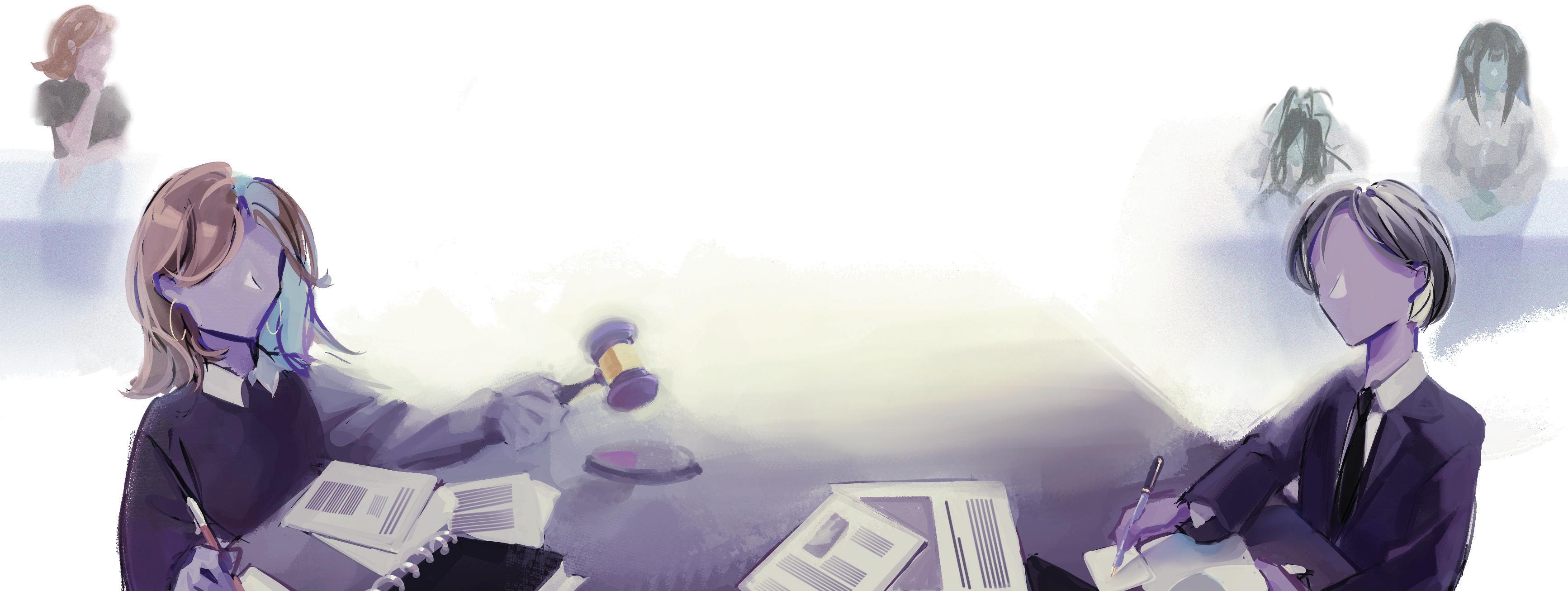 - Sol Eisenbeis‘23
- Sol Eisenbeis‘23
compared to the 3.8 hours before.
Senior Sol Eisenbeis said, “I feel less motivated this year. I think a lot of motivation is inter-connection. Because we were unmotivated for that period of time, it’s hard to get back to the swing of things and reconnect with what used to motivate us.” This lack of motivation was shared by many nationwide, especially during the pandemic. According to a Pew Research Center
Though there are still lingering effects of the pandemic which students and teachers alike are feeling, there is also a joy within the Masters community for the reconnection this year has brought. “I remember the first day we returned to campus after the pandemic. It was a very joyful and special moment.
Remote classes are fine and solved a problem at the hardest time of the pandemic; but human beings are made to be with other human beings, not to be in confinement,” said Spanish teacher Roberto Mercedes.
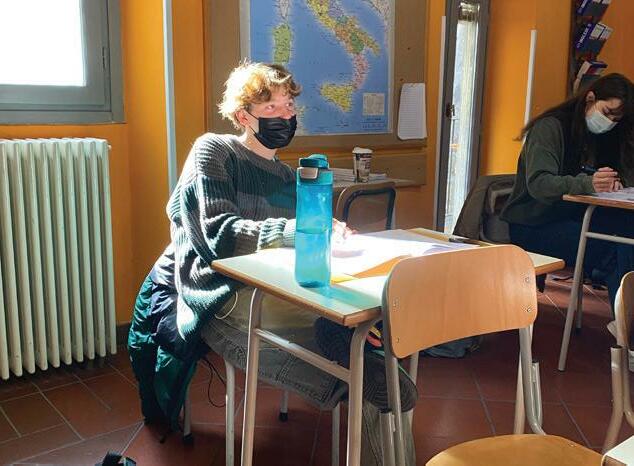
Alongside the rediscovered human connection within the com -


munity is the return to regular paced courses. John Boyer, Science department faculty and physics teacher, said, “Classes during Covid were a bit slower than now, especially during the first year. The second year we pretty much got through everything…and now students are learning at a pace that’s comparable to the way they moved three years ago.” For Boyer and the science department, this year has been about putting the pandemic behind and looking towards changes the future may bring. He said, “I would say most of our conversations recently have centered around things that are newer. We talked about the schedule, about whether or not AP classes are going to stay. We talked about DEI and how to incorporate that into our classes.”
Senior Ashleigh Woodruff also felt that the return to normal and fully in-person have allowed her to return to the ease from before the pandemic. “I am a very in-person learner. I learn better when I can do something actively and collaborate. So I would say that in that sense it is easier right now than it was in the pandemic,” she said.
Although Masters is embracing this return to normal and adjusting the curriculum back to its past rigor, an education disparity between schools and across states is leaving many institutions in a more serious struggle against the post-pandemic learning loss.
The NAEP results show that, while the reading scores for New York City saw little change since 2019, those in Atlanta, Detroit, Cleveland, and many other cities decreased. This points to an disparity in education which is a result of the inequalities between races, genders, and socioeconomic groups.
This phenomenon can also be seen in the local community. Wood, who is also a member of the Dobbs
Ferry School Board, said, “It is something we have talked about in the school board. “I think Dobbs Ferry, like other school districts, has seen different demographic populations within the town and district. Some are further behind than others and learning gaps appear across the population as well.” However, Wood observed, it is also important to recognize the role standardized evaluations play in this phenomenon. “It’s interesting,
one of the reasons it’s appearing in public schools is because public schools have standardized ways of measuring student learning. But private schools don’t,” he said.
The pandemic has had a significant impact on education in the past years, the effects of which can still be seen in schools across the country and nation today. However, the classrooms’ return to normal this year can be a first step in recovery. Mercedes said he
has been enjoying the new found energy in his class rooms and is looking forward to a better future, “the energy of Spanish classes can be heard when students sing La Llorona, Limon y Sal, Mi Querida España or when students say ¡Animo! We continue building the sense of community in our Spanish classes in order to be the Power for Good in this challenging world.”
Florida’s Parkland shooter lives to see another day
Nikolas Cruz has been found guilty of frst degree murder after carrying out the tragic shooting of seventeen innocent lives in the walls of his previous high school, Marjory Stoneman Douglas. The jury voted that Cruz should not be subjected to the death penalty, but rather spend the rest of his life in prison without the possibility of parole. This decision came as both a shock and a let down for the victims' families, who were eagerly anticipating his execution.
Closing off a sixth month trial, the jury’s decision was not the outcome people expected, as Cruz carried out one of the most brutal shootings in American history on Feb. 14th, 2018. The prosecution on the case expressed to the jury that
Cruz is a sociopath, and that the massacre was premeditated. There was evidence showing that he was searching for online information pertaining to the future massacre: such as the words “shooting” or “murder.” Detective Nick Masters, an electronic data analyst, read his searches aloud in the courtroom. He also mentioned that Cruz would leave comments behind on YouTube, expressing his desire to commit a crime.
The defense argued that he was diagnosed with mental illness, and ultimately the jury found that the mitigating circumstances of Cruz’s case outweighed the aggravating ones because of that factor. This means that although his actions were depraved, his culpability was lessened due to the fact he has irrational thoughts.
Cruz’s mental health issues came to light in Fort Lauderdale, Fla. on Aug. 16th, 2022, when a defense mental health expert listened to him
talk about his plans on the outside of the prison walls. In alignment with his diagnosis of mental illness, Cruz expressed little remorse for the lives he took, which is originally why the death penalty was an option, but because of capital punishment’s decline in usage, three members of the jury decided that it wasn’t warranted. Florida, as one of the 24 states practicing the death penalty today, requires a unanimous decision of the jury before sentencing the defendant to the electric chair or lethal injection. Therefore, his life was spared.
The families of the Parkland victims had waited a grueling
four years for the trial to commence, as it was postponed twice due to a juror threatening the defendant. Several parents of the victims were seen walking out of the courtroom in dismay when the jury read off the decisions. They did not see the reason for the death penalty even existing if it was not going to be used in a case like this.
led to a national discussion on how gun control should be regulated. Rallies took place across the world, largely led by young people who are tired of seeing and hearing about the massacres. Students involved in this battle are growing impatient as they have yet to see much change surrounding the movement.
Adrien Blanc, a senior, maintains that the death penalty is more of a vengeful act, rather than one that will supply justice to the victims’ families. “I do believe that people who commit harmful acts should be punished accordingly, but I also feel that the goal of the prison system isn’t to kill people, but rather keep them off the streets,” he said.
child is still gone. There’s no way to forgive Cruz for that, but I don’t believe the death penalty would bring them serenity,” Blanc said.
Senior Eli West developed a new perspective on the case after hearing the victim’s families respond to the jury’s decision. “One of the statements made by a victim's family member said that society has to re-examine who is a victim. This resonated with me. These teenagers suffered a domestic terrorist and yet everyone is talking about the shooter’s mental health,” West said. Although he believes this is true, he maintains that Cruz was doomed from the beginning of his life, making it a mitigating circumstance in the courtroom.
The shooting instigated an anti-gun violence movement, which

While Cruz’s case is nothing to be taken lightly, Blanc trusts that the death penalty isn’t the answer that will bring peace to the families of the victims. “Unfortunately, at the end of the day, your
“I don’t think the families will ever be at peace after this, and I don’t feel that the death penalty would have changed that for them,” he added.

VOLUME 79, NUMBER 1 November 4, 2022 TOWER The Masters School 49 Clinton Avenue Dobbs Ferry, N.Y. 10522
RYAN GUAN/TOWER
@masterstower
STUDENTS SIT IN BUSINESS dynamics class with Hank Kim as they learn about nancing and investing. This class teaches students about the market economy.
“
ALYSSA WANG /TOWER
I feel less motivated this year. I think a lot of motivation is inter-connection. Because we were unmotivated for that period
“
- Adrien Blanc‘23
EVALUATING LANGUAGE REQUIREMENTS
I do believe that people who commit harmful acts should be punished accordingly, but I also feel that the goal of the prison system isn’t to kill people, but rather keep them off the streets
Lead News Editor
PAGE 8 SCAN TO READ MORE AT TOWER.MASTERSNY.ORG!
GISELE CESTARO
Students and admin cannot agree on climate march
their teachers and get caught up on any work, so that is what the expectation was on that day as well.”
Masters EFFECT—a club that specializes in environmental sustainability — arranged for students to leave school early on September 23, take the train to Manhattan, and participate in a oncea-year nationwide strike to speak out against lawmakers who aren’t pushing to stop climate change.
In the words of Jeff Carnevale, dean of students,“Being an activist is part of being a Masters student.”
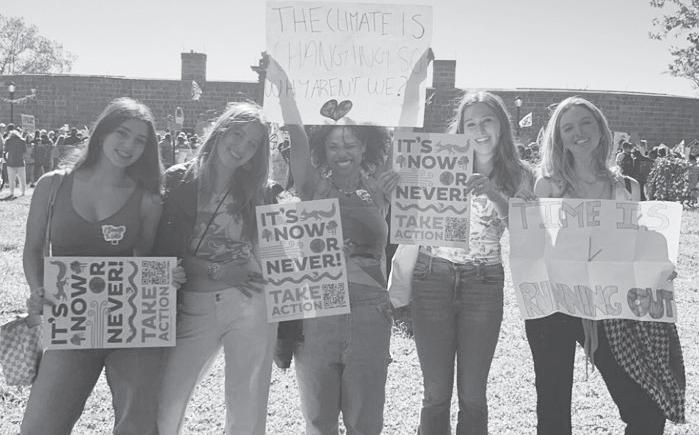
However, the day of the climate strike was the same day as the annual Founder’s Day celebration. Since students who were attending the march would be missing academic classes before the Founder’s Day event began, confict built up between the student body and the Upper School administration over whether students who missed classes would need to make up work and follow up with their teachers. The administration decided to treat it as a usual excused absence, which would require those students to follow up with their teachers as usual.
Despite the excused absence, students who attended the march were not happy because they still had to meet with teachers for the time they missed. Addressing this concern, Carnevale said, “ [Meeting with teachers] is part of being absent from school. Whenever a student is absent from school, they are expected to connect with
EFFECT’s senior advisor Tyler Hack and Co-Chair Sophia Semczuk see it differently. When asked why there was a confict in the frst place, Hack explained that the march was “an event that is bigger than Masters” while Founder’s Day is a “moveable” event.
Hack said, “The DAA Co-Presidents tried to move Founder’s Day or move it to that morning so the students could participate in Founder’s Day and still make it to the march.” However, due to the scheduling decision that the administration made, there was no budging on the moving of events.
On top of this, Semczuk noted that EFFECT had given administration a heads up about the event happening over a year in advance, and Founders Day was still coincidentally planned for the same day. Once they realized the administration would not shift the date, there was no intent to cancel EFFECT’s participation in the march, but it was a setback.
Semczuk said, “There was defnitely disappointment and it felt like something that could’ve hindered us from having success with the event.”
Peter Newcomb, head of Upper School, had a different perspective. When he was frst approached with making a unique excuse for the students attending the march, he said, “What qualifes as a larger event? There are lots of once-a-year events that happen that people feel strongly and passion-
ately about and it’s not our place to say this qualifes [for a certain level of absence] and this doesn’t.”
This approach made both march attendees and EFFECT leadership feel that Newcomb, administration and Masters as a whole was not valuing the importance of this
event. In response, Newcomb said, “We are not treating this differently, but that doesn’t mean it’s not important. It’s just we’re not positioned to say, ‘This is an important one that you believe in and this is an important one that we [Masters administration] don’t believe in.’”
“It
of the protest and having the willingness to leave on Founders Day to support this cause,” Semzuk said.
On top of that, Newcomb said, “I think they did a great job. They didn’t get the result they wanted, but I thought they did a wonderful job of articulating a rationale for this event.”
TEDx The Masters School returns after COVID hiatus
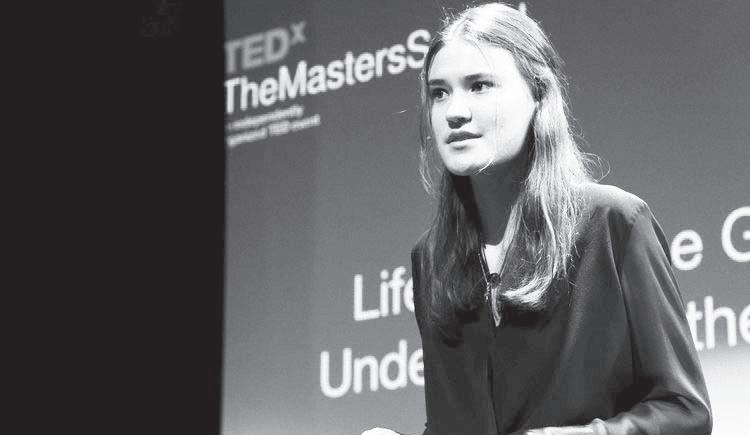
talk was given in the Experimental Theatre. The program was a massive success, but things got difficult when the pandemic hit in 2020. TEDx was attempted over Zoom, but according to Berrol it was impossible to do. Fortunately,
the program is making a comeback.
“I’m thrilled,” Berrol said. “I think TEDx gives students such an immense opportunity; those students who dive in can really investigate an idea that they've had, for a long time like a suspicion, philosophy, or a way of going through the world that they're eager to share with more than just our community. I am very excited about the potential, and it's always a thrill to work with students on their research.”
Stacy Van Beek, co-advisor to TEDx, shared Berrol’s excitement. “I'm looking forward to just learning what the students are interested in. I'm also looking forward to helping the students practice and rehearse the physicality and the vocal stuff. I have a background in theater. As a teacher, I've never really been able to use it, so this is theater-adjacent and that will be fun,” Van Beek said.
In spite of this, the process
of giving a TEDx talk can be very challenging. Berrol said, “I think it's very difficult because students start with an idea that's just a paragraph long, and it builds to a five to eight minute talk that has to be memorized and researched. The research has to be thorough,
or when the camera is rolling.”
Though the process is rigorous and challenging, it’s tremendously rewarding; as Berrol said,“I think that there's nothing that a student will do at Masters that will compare to this.”
“I think TEDx gives students such an immense opportunity; those students who dive in can really investigate an idea that they’ve had, for a long time like a suspicion, philosophy, or a way of going through the world that they’re eager to share with more than just our community.
- Lisa Berrol
it has to be corroborated, and it has to be really well crafted. Mr. Ebersole has been instrumental in helping our students to go off script because it's very difficult. There are also some students who can write really well but have a hard time being onstage
Junior Elijah Brooks is ecstatic about applying for the TEDx program, though he’s still not sure about his topic. He said, “I’m not exactly sure what topic I want to do yet, but I do want to share something that means a lot to me; I want a crazy attention grabber that gets the whole crowd shocked.” Brooks also noted that he wants to take advantage of the opportunity to help his public speaking skills.
The TEDx application and audition process is open to all Upper School students as a winter co-curricular. Though the application is open to anyone, however, there are only a limited number of spots available and the process may be competitive.
Boarders gather for October community weekend
the year, during which people ate snacks, danced in the common room, and got to visit friends’ rooms.
The October 14-16 weekend marked the third community weekend of the 2022-23 school year. Seven-day boarders were required to stay on campus and five-day boarders were allowed to stay and be a part of the activities that weekend. Activities included a museum trip, community brunch, and apple picking. The weekend started strong with a performance that night in the CBT from mentalist Robert Channing. His accurate guesses and descriptions of random objects, numbers, and answers to questions written on paper captured the crowd’s attention and kept them engaged.
“It was very fun. He read a lot of people’s minds and it was insane how he was able to read off of people’s cards without using his eyes, that was pretty cool”, said senior Luna Minnifield. My favorite part was with Matthias and Eunice when he told them to go out in the crowd and collect six random items from the crowd. He guessed the first four, and didn’t mention the last two until the very end when he told them to give it back to the crowd.”
Later that night, Thompson hosted the first open dorm of
“I’m new, so I’ve never really had an open dorm before, but it was an enjoyable experience and I think it was fun for everyone else to see mine and the rest of Thompson dorm’s living space,” said sophomore Brody Dubilier.
On Saturday, boarders and some day students went to visit the Museum of Modern Art (MoMA). Students got to see works such as Vincent van Gogh’s The Starry Night, Salvador Dali’s The Persistence of Memory, and even Frank Ocean’s Blonde album cover.
“I wasn’t part of the trip at first – though I saw that my friends were in the city – but they invited me and I pulled up. It was pretty fun; my favorite exhibit was the one with the Frank Ocean picture. It was really cool,” Matthew Hantgan, sophomore and day student, said. “I liked being around the art, it had such a great vibe.”
On Sunday morning boarders gathered in the Dining Hall for Cole Dorm’s community brunch, the second one this year following Strong’s brunch in September. The Dining Hall was decorated to suit Cole’s Halloween theme with cobwebs and ghosts, and an all black dress code was set. Students in Cole
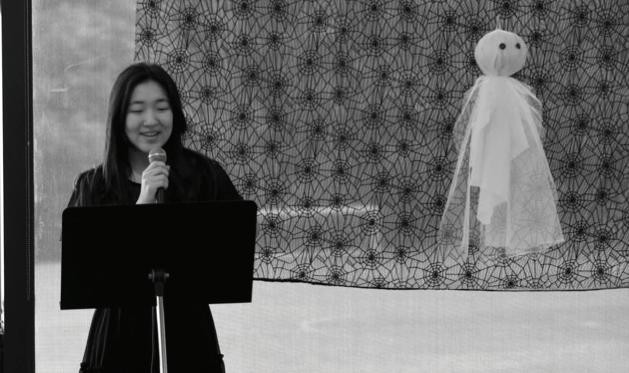
decided to assign people to random tables to encourage people to form new connections with people that they might not speak to regularly.
“The idea to sit with people
you don’t know with random table assignments was pretty nice. I got to sit with Ms. Jansen, Ms. Danforth, Demo, Bob and Jerome. It was pretty good, we got into a deep conver -
sation.” junior Elijah Brooks said.
Later that Sunday a smaller group of boarders stopped by Wilkens Farm to do some apple picking.
“It was pretty good, I really liked it,” sophomore Velizar Lazarov said, “I got to spend time with my friends and overall it was really fun.”
After a three-year hiatus thanks to COVID-19, TEDx
The Masters School is return -
ing. In 2017, Upper School History teacher Lisa Berrol was approached by Head of Upper School, Laura Danforth, with the vision of bringing the TEDx program to Masters. That vision became a reality when the first TEDx
2 NEWS TOWER/NOVEMBER 4 , 2022
Despite EFFECT students still not being happy with the decision from the administration, both the march and Founders Day were deemed successful by participating students.
was really great to see people expressing genuine care about the protest and the message
A GROUP OF SENIORS march for climate justice in New York City. Behind them, a crowd is gathered before various speakers, addressing the protests’ goals. 2000 people attended the march this year, marching from Foley Square to Battery Park chanting various songs and role calls for the ght against climate.
Photo/Illustration Manager
EILEEN KANG ‘26 CELEBRATES COMMUNITY the Dining Hall during Heads’ Brunch. The brunch allows boarders to bond with their friends and forge relationships early in the school year, holding a special signi cance for many in the Masters community.
SOPHIA FORSTMANN ‘20 GIVING her Ted Talk, “Before the Grocery Store: Understanding the Value of Food.” Throughout her time at Masters, Forstmann involved herself in various sustainability initiatives and served as vice chair of EFFECT. Her Ted Talk aimed to raise community consciousness of unethical food sourcing.
RYAN GUAN//TOWER
Opinion Editor
M ATTHIAS J AYLEN
C ARLOS H EREDIA Marketing Director
J OSH M ARKOWITZ
MICHELLE WEI//TOWER
MAIA BARANTSEVITCH//TOWER
the progressive health policy for an evolving community
XavieR Rolston Web Editor
During the 2021-2022 school year, Masters’ policies on substance abuse changed dramatically. The previous punitive model — a zero-tolerance procedure in combination with a non-disciplinary “sanctuary” policy for students who approached the school for help with a substance abuse issue — was abolished, allowing room for the implementation of a newer progressive model. The school’s new, expanded, procedure regarding students who come to the school for help with substance abuse or other issues is called “Amnesty.”
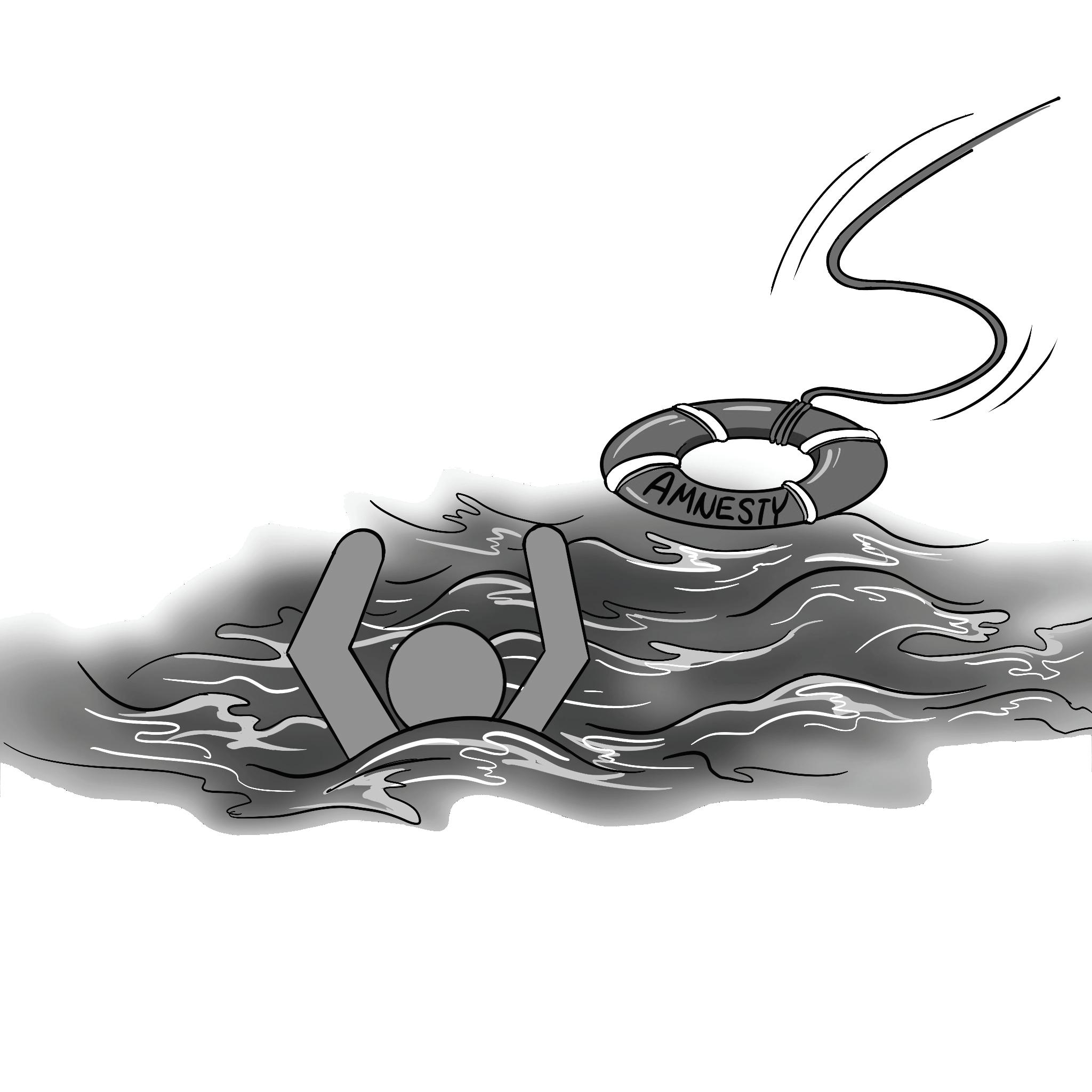
The administration’s goal in creating this policy was to encourage students who are struggling with issues where their health or safety are at risk to seek help without worrying about disciplinary consequences. Dean of Students, Jeff Carnevale, said that while sanctuary had existed for a long time, it was outdated.
“Sanctuary only focused on issues involving substance use, for which there might be a violation of Masters rules that would prevent a student from getting help,” Carnevale said. “Amnesty takes a broader lens, and incorporates more than just drug and alcohol-related issues, but anything that would put a student’s health or safety at risk, that might also involve a violation of school policy.”
Masters developed the Amnesty policy over the course of several years, consulting sources both within and outside of the school.
Katie Koestner, a prominent activist who aided Masters in developing the Family Handbook’s policies on sexual misconduct, also worked to develop the Amnesty
policy. After careful consideration by the administration, they changed the new term to “Amnesty.” Carnevale expressed the connotation associated with the term sanctuary was not ideal, potentially driving students away from seeking help.
“Sanctuary implies something that needs to be sought out, whereas Amnesty is something that exists,” he said. “We want it to be a place where students feel they can get the help that they need.”
The switch to a more progressive, restorative practice is certainly in line with Masters’ mission statement. Carnevale remarked that “the Amnesty policy falls in line with what we believe as a school and an institution.”
Masters is actively engaged in restorative justice conversations, making sure students can learn from their mistakes and correct their wrongdoings. John Boyer, a faculty advisor of Community Council, delineated the importance of restorative practices. He stated that Community Council’s goals with restorative justice work involve prompting students to “reflect about whatever incident has brought them in front of us, and try and learn from their mistakes and grow from it. We also talk about the kinds of things that we can do to repair harm, when that has occurred.”
While substance use cases are not sent to Community Council, the same principles Boyer highlighted are applied by the Dean’s Office when dealing with these cases.
Carnevale elucidated the importance of prioritizing restorative practices over punitive models.
“This is a more humane response that respects the health, wellness, and dignity of each individual, rather than being a draconian punitive response,” he said.
Nevertheless, critiques of the
Amnesty policy are prevalent among the student body. A student who entered the Amnesty program last year (who wished to remain anonymous) stated that “The main reason students are reluctant to use Amnesty is it’s supposed to be a non-disciplinary approach, but is in every single way characterized as a disciplinary approach.”
The anonymous student elaborated that mandated health evaluations and counseling, communication with parents, and financial burdens from drug testing and psychiatric evaluations are factors that generate fear among the student body.
“The continuous drug testing — which is going to be throughout this year, and then throughout the next year, as well — we have to pay for every single one of those tests,” the student said. He added, “The Counseling Center is free, however, one requirement in my Amnesty contract is you have to get continuous outside psychiatric help.”
However, the school’s case-bycase approach to Amnesty helps students and families who are in difficult situations, financially or otherwise. Carnevale said in these situations, “the student and their family start working with the Counseling and Health Center, who have connections, and often can help a student and their family find and locate and work with an outside provider. And in many cases we have.” He continued, stating that “[Masters does] have some providers who work with our families on sliding scales or some even pro bono. We do the best we can to support a student and their family through that.”
Carnevale also clarified where disciplinary actions are still taken.
“If a student is caught using substances, that’s a different matter. But if there’s a concern about another student’s safety and health,
New gender-diverse affnity group forms on campus
Rooke WiseR Accountability and Media Advancement Manager
On Friday, October 7, Jayde Bennett–director of residential life and associate dean of students–alongside history and religion teacher Brendan Collins-Jordan spoke to the upper school community during morning meeting about the newly formed Gender Diverse Affnity Group on campus.
The group is designed to create a safe environment for community members–including students, faculty, and staff–who identify as transgender to discuss and share their thoughts and experiences. “It is a space for students, faculty and staff, of trans, non-binary and gender di
school,” Bennett said.
During the spring of 2021, Bennett and Collins-Jordan were a part of a subcommittee in Diversity Equity and Inclusion (DEI)–the gender task force–and helped plan focus groups with students and staff on the topic of gender. While facilitating the groups, it became clear that students not only wanted but needed a place to affrm and discuss gender. “There is a lot of information about how you can be affrmed on campus that is just not public knowledge, and a lot of [kids in the focus groups] were asking, ‘How do I change my name in the LMS? How do I change my pronouns?’ It was clear that we need a space to discuss these things,” Bennett said.
Furthermore, students shared potentially traumatic experiences and wanted a place to lean on one another. In response to the growing
Although spaces that facilitate an inclusive environment of community for LGBTQ+ students already exist on campus, such as the Q+ club, these spaces are also open to heterosexual and cisgender members. “Q+ has a wider umbrella of identities that the club is talking about and programming about, and much of that programming has to do with sexual identity,” Collins-Jordan said. On the other hand, the new affnity group is limited to exclusively transgender community members.
On campus, LGBTQ+ information centers primarily around sexuality. On the other hand, this new affnity group brings attention to the gender aspect in order to stop the confation of sexual identity and gender identity. “There are a lot of ways in which trans and non-binary identities don’t necessarily get celebrated and talked about as part of the normal course of school events, either in classes, presentations, or clubs,” Collins-Jordan
Additionally, the group provides a common ground for transgender individuals that doesn’t require repetitive explanations of their experiences to non-transgender individuals. “This is a space where there isn’t a burden of processing cis-feelings or having to educate cis people; the sort of burden that trans and non-binary people do in day-to-day life,” Collins-Jordan said.

Since the group is so novel, the objectives are not yet thorough, and the group is still fguring out the central aim. “We’ve been asking the students and folks in the group, “What do you want to see out of this?” Bennett said.
The group is intentionally left open so that it can be as responsive to the community’s needs as possible and potentially make adaptations on campus to better support transgender individuals. As Bennett said,“There’s not really one specifc goal. I think it’s always shifting. Like our identities, it’s always in fux.”
that’s how we’re going to address it: As a health matter, and not a disciplinary one.”
Jayde Bennett, associate dean of students and director of residential life, further added that if a faculty member catches a student using substances, the situation will not be handled as an Amnesty situation.
“If a faculty member is going around and doing check-in, for example, and they happen to walk in on a situation, that’s not Amnesty. That is [a student] caught doing something [they] were not supposed to be doing. There was no attempt made to reach out or seek support based on a student’s wellness.” However, situations
proactive you’re being.”
Student’s feeling that Amnesty proceedings are disciplinary in their effects are not uncommon, Carnevale noted. “It’s really important for students to understand that it is a non-disciplinary process. And that means that things happen, but that doesn’t mean that they’re disciplinary in nature.”
Students such as the anonymous interviewee have described Amnesty as feeling like a suspension, which Carnevale clarified is not the case.
“They may involve needing to be away from the school for a period of time while you’re going through a health process, but that isn’t disciplinary,” he said. Amnes -
pen. They’re not necessarily disciplinary, but sometimes they feel punitive.”
Fear and outrage within the student body often come from a lack of information about the school’s approach or how these issues are handled. But in most cases, information on individual cases cannot become public knowledge.
“I wish students gave a little bit more grace to the fact that these are delicate situations no matter what. There are a lot of privacy concerns that go into this, and quite frankly, being a student here doesn’t automatically mak e you privy to certain information. There are certain protocols in place that we have to follow,” Bennett said.
Itaewon crowd crush T he deadliness of overcrowding
MaRianna Gu Lead Features Editor
On Saturday night, a deadly incident happened in Seoul and took away at least 151 lives, the deadliest peacetime incident in Korea since the sinking of MV Sewol. The Itaewon district is known to be a popular place for Halloween celebrations given its stylish restaurants and clubs, but this year, the supposedly cheerful and exciting festival ended with dozens of dead bodies lying on the side of the streets.
Right outside exit two of the Itaewon subway station, as many as 100,000 people crowded the narrow alleyway. The deadly crowd crush began with people on the back pushing forward and people on the
front pushing back. Then someone at the front fell and the rest of the crowd collapsed like dominoes, one piling onto another. Kim Seojeong, a victim who survived the crowd crush, said, “We shouted and screamed for help, but the music was so loud in the alley our shouts were drowned.”
While some blamed the government for lacking to deal with crowd management and planning for such festivities, others think that the end of the pandemic is the main reason for the unusually large number of people who poured into the narrow streets of Itaewon.

Senior Youri Lee who was born and bred in Korea said, “For the past two years, we couldn’t go out to celebrate Halloween because of Korea’s strict quarantine policy, so people just really want to go out and most of them are college students.”
Some members within the Masters community are closely attached to the incident. Eileen Kang, ‘26, who is from near Itaewon said, “Because I attended international school and was exposed to foreign cultures, I have many foreign friends who live in Itaewon. As soon as the news came out, I texted one of my friends who went to the parade and she didn’t reply. So for a few moments, I went as far as thinking she might have been one of the victims, and I was actually freaking out, but later she texted back saying she was fne.”
In an interview with The New York Times, Choi Jae-won, a senior Seoul health offcial, predicted that the death toll could continue to rise as police and medical workers are still performing resuscitations to people sprawling on the street.
TOWER/NOVEMBER 4, 2022 NEWS 3
JENNY XU/TOWER
THIS SYMBOL REPRESENTS THE people that identify as transgender or non-gender identity. The new gender-diverse af nity group is the rst space at Masters for trans and nonbinary students.
JENNY XU/TOWER
THE MORNING CALM/CREATIVE COMMONS: Amnesty:
ITAEWON IS A NEIGHBORHOOD of South Korea’s capital and largest city, Seoul. Well-known for its bustling shopping and dining scene, Itaewon hosts a Halloween celebration where the tragic deaths occurred.
OpiniOn
Vote like your education depends on it
On Nov. 8, millions of voters in the U.S. will be fling into local voting stations, including many seniors at our school. In the upcoming midterm election a new topic has risen to become a priority for many voters – education.
On Oct. 31, The Supreme Court held its most recent hearing regarding the lawfulness of affrmative action policies. Since the beginning of midterm elections, debates have been rising in the U.S. as the Supreme Court moves to overturn affrmative action – the practice of favoring individuals belonging to groups known to have been discriminated against previously. If this decision to overturn affrmative action is made, the course of college applications will be altered for the
upcoming classes, making the class of 2023 the last to be infuenced by its process. As a diverse community of high school students, many of us will be negatively affected if this decision was to be made. Though it is not a prominent part of many students’ lives at the moment, any changes in affrmative action will inevitably affect us all. On the other hand, President Biden presented the Student Debt Forgiveness Program on Oct. 14. With the pandemic’s lasting effect on the U.S. economy and the rise in college tuition, the cost of receiving a higher education has become a burden to many students. This program, sponsored by the government, will provide targeted debt relief to address the fnancial stress of university students and families.
As deadlines approach for both college applications and midterm election voting, many students are being affected with these life altering political and educational decisions. Apathy is not an option. We as students have the opportunity and responsibility to make an impact in this election. Tower wants to encourage all those who can to vote, and those who are approaching the voting age requirement to register. For those who are not yet old enough, you still have the power to make a difference. Follow the news, work for local campaigns, and spark conversations with family members, as long as you are willing, you will be able to contribute to decisions that can impact your future.
EDITORS-IN-CHIEF MAIA BARANTSEVITCH ELLIE YANG
MARKETING DIRECTOR CARLOS HEREDIA
NEWS LEAD EDITOR GISELE CESTARO
NEWS EDITORS ALEXA MURPHY OLIVER KREEGER
OPINION LEAD EDITOR MAYA PHILLIPS
OPINION EDITOR MATTHIAS JAYLEN
FEATURES LEAD EDITORS LUCAS SEGUINOT MARIANNA GU
FEATURES EDITORS LILY ZUCKERMAN TARA PHILLIPS
SPORTS LEAD EDITOR NOAH KASSEL-YUNG
SPORTS EDITOR ADAM BELLO
SOCIAL MEDIA MANAGERS LYDIA ETTINGER SANDRA LIU
A crisis communication divide creates confusion
 OLIVER KREEGER News Editor
OLIVER KREEGER News Editor
In a school of over 600 people, communicating during tense situations is always going to be diffcult. In the past year, for instance, Masters as a community has grappled with two unprecedented situations: in December of 2021, panic spread for a day as talk of a student bringing a weapon to school spiraled out of control, and recently, in September 2022, as a “Sexual Assault At Masters” Instagram account shared anonymous stories of sexual misconduct by student victims. In both cases, some students perceived the administration as doing little to nothing in the immediate aftermath. While administrative actions have in retrospect proved to be well-managed and well-meaning, during the heat of the moment, because the school administration often cannot share specifc information, the perception among students can be that little was done by the administration.
“My frst thought was confusion,” said Serena Sharma, ‘25, recalling the panic over rumors of a student’s threat to bring a weapon to school in mid-December 2021.
“There wasn’t much information going around, so I heard most of the information I got from ru-
mors, they were all over the place…one person said a punch was thrown, one person said that the person who did it threatened to shoot up the school, they said that he had a gun on him - there were all kinds of rumors going around, so my frst thought was confusion and wondering what was the true story that happened,” Sharma said. Eden Leach, ‘23, had a similar experience and recollection.
“What I found was that they weren’t really communicating very well with the parents, they were omitting very important details,” Leach said, “I told my father about it, and later that evening he received one or two emails that mentioned an incident, but barely mentioned at all the then-potential shooting threat.”
Sharma, who heads the Masters Domestic Violence Awareness Club, also recalls the perceived lack of clarity as revelations about sexual misconduct emerged on social media this September. “About Sexual Assault At Masters…I hadn’t really gotten that information, but I wish I had. I wish maybe
there was a more clear saying that ‘this is a thing’, because I think that was something that was not communicated.” The Dean of Students and the Head of School did address the entire Upper School twice in the days after the Sexual Assault at Masters account was created, as well as sending emails about the account to the entire school community.
Sharma said, “For the alleged gun threat, what happened is that there wasn’t a lot of communication, and there were rumors fying everywhere, and I think what needed to happen was for someone to say, at the beginning, what infor-
LISA YAO/TOWER
physical act, or make any mention of weapons, we took it seriously and will continue to do so.”
WEB EDITOR XAVIER ROLSTON STAFF WRITERS ALLY PAGANO VIKTORIIA SOKOLENKO
mation they had about the event.”
The day of the rumored weapon threat incident - it did turn out there was no such threat to bring in a gun - Head of School Laura Danforth said this in an email to families: “Earlier today, several upper school students were involved in a confrontation regarding a series of inappropriate social media posts, to which the School was recently alerted and which we are investigating. Following the confrontation, which took place in the Fonseca Center, one of the students involved in the confrontation made a troubling remark. While the remark did not threaten any specifc
Peter Newcomb, the head of the Upper School, offers insight into how the administration handles situations where lots of students are searching for answers. A key issue during crises is that, according to Newcomb, students can be told “very little” during the event and immediately afterward. “We make sure we’re respecting the privacy of those involved, and communicating where we think it’s appropriate, but in some of these instances, be it sexual assault or drug and alcohol use, by and large these are handled without engaging the entire community, but there are times where we feel it’s in the best interest of the school to have some specifcs,” Newcomb said. Newcomb does feel that a communication divide is inherent between administration and students in these situations, mainly through the sources of information people seek - offcial school communications (or lack thereof) versus social media. When there is no school communication, Newcomb encourages students to not immediately seek out a full answer. “You can certainly inquire, but when we don’t share information it’s intentional. I understand the desire to know, but it’s not peoples’ prerogative to know about individual disciplinary cases.”
ED vs RD: the crossroads all seniors face
SANDRA LIU Social Media Manager
Early Decision (ED), is a type of early admission used in U.S. college admissions for first year students in undergraduate programs. ED is a great opportunity for candidates to show universities that they consider that school to be their first choice. However, ED involves many things to consider, such as binding policy, earlier submission deadline and financial aid, and behind the ED’s seeming ability to increase admissions rates also lies the disadvantage of time limitation. Therefore, there is no right answer to this question, weighing the benefit from both side and follow the heart is the most helpful way to make a choice that people won’t regret.
“It gives me the best chance of getting into the school I want,”
senior Cesco Desiderio said.Applying early decision will result in a greater chance of admission to most colleges; in the 2020 to 2021 admission cycle, Brown University accepted 38% of Early Decision applicants, while on the other hand they accepted only 17% of Regular Decision (RD) applicants.
However, ED is not always helpful and not always the right choice for all students. “The acceptance rate of each university cannot be judged by simple numbers alone,” Adam Gimple, Director of College counseling, said. “Some schools, such as the University of North Carolina, have fixed quotas for the number
of students from their own state and may not be as friendly to students from other states, so the acceptance rates for ED and RD will not be very different.”
Gimple also mentioned that only half of Masters School students chose to apply ED from 2018 to 2021, a figure that is less than many might think.
Another reason which makes applying Early Decision seem less appealing is the binding policy. Students who are accepted as ED applicants must attend the college. “For ED, I know that you have to make a commitment to one school, and I would want more time to prepare for regular decision. Because regular decision allows you to take time to choose what school you want,” senior Delilah Vega said. Another reason for applying ED is financial aid. Some students who need to apply for financial aid often choose to apply RD because it gives them the opportunity to choose the college that gives them the most financial aid. Conversely, the single choice of ED stifles their opportunity to compare.
Overall, the ED application is a double-edged sword, and it is important to bear in mind some of the benefits it offers while also considering the limitations it provides, both in terms of school choice and major selection.
PHOTO EDITOR JOSH MARKOWITZ
ADVERTISING & DISTRIBUTION MANAGER JUSTINE PASCUTTI
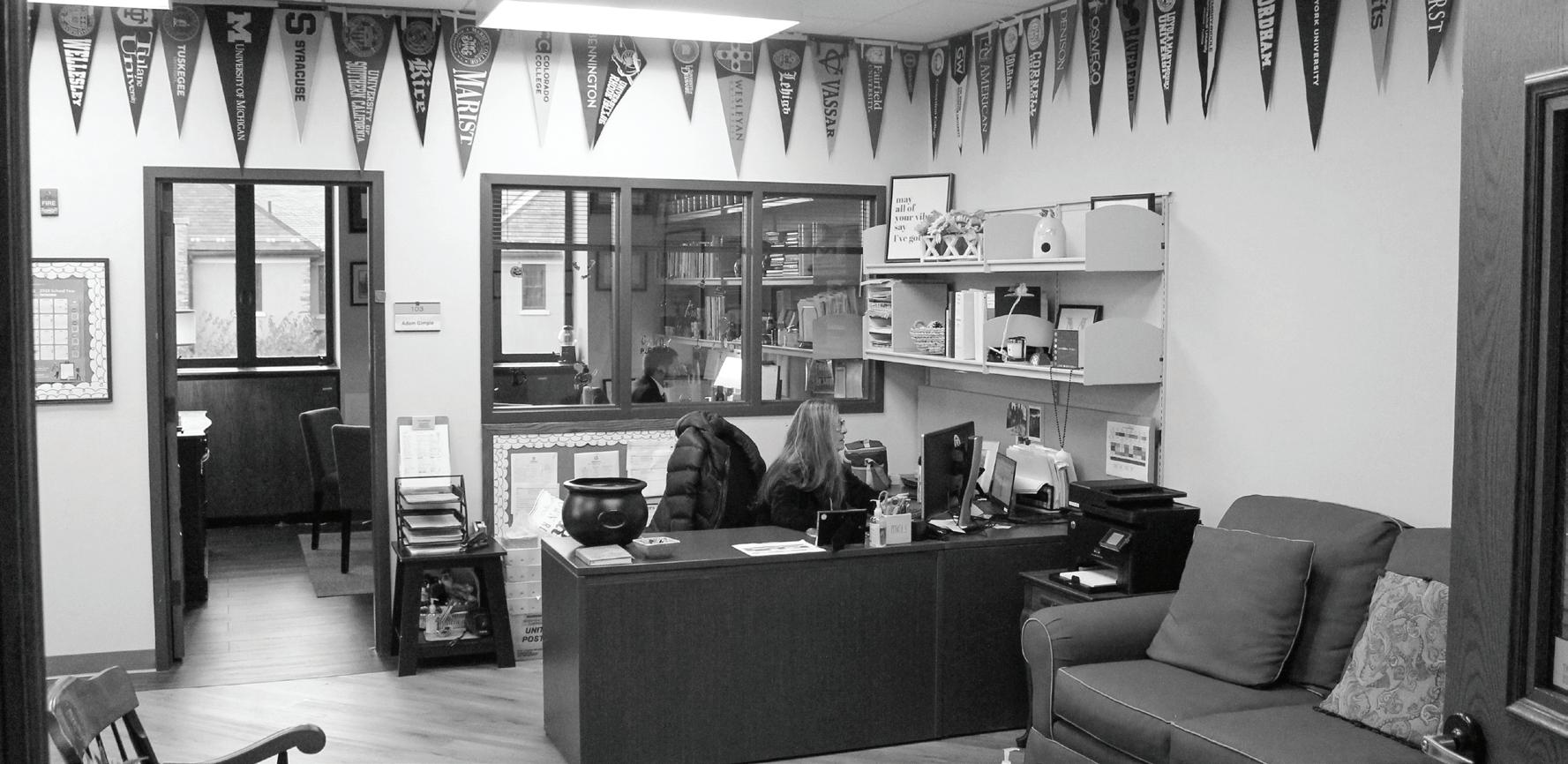
EXECUTIVE PRODUCERS, TOWER BROADCAST NEWS CAROL QUEIROZ HANNA SCHICHIANO
LEAD COPY EDITOR AURORA ROSE HORN COPY EDITOR AVIV EMERY
ACCOUNTABILITY & MEDIA ADVANCEMENT MANAGER ROOKE WISER
STAFF PHOTOGRAPHERS & ILLUSTRATORS ALPHA ZERFU JACK PARSONS CHANA KIM LISA YAO HARRY XIONG RYAN GUAN JENNY XU ALYSSA WANG SONALI RAO SYDNEY STARKEY EUNICE WANG
FACULTY ADVISERS
ELLEN COWHEY
Facebook:orgMastersTower Twitter: @MastersTower Instagram: @MastersTower distributiOn PrOcess Tower is hand-delivered on the day of publication to the Up- per School. 650 copies are print- ed. A copy is sent to each of our advertisers. schOlastic Press affiliatiOns, letters and editOrial POlicy Tower is the winner of the Pacemaker Award for Overall Excellence, an award-winning member of the National Scholastic Press Association (NSPA), Columbia Scholastic Press Association (CSPA), Journalism Education Association (JEA) and Quill and Scroll. We encourage Letters to the Editor, which can be submitted to the following email address: TowerEditors@MastersNY.org. Published approximately fve times a year, Tower, the student newspaper of The Masters School, is a public forum, with its Editorial Board making all decisions concerning content. Commentaries and opinion columns are the expressed opinion of the author and not of Tower and its Editorial Board or its advisers. Furthermore, the opinions conveyed are not those of The Masters School, faculty, or staff. Unsigned editorials express views of the majority of the Editorial Board.
TOWER/ NOVEMBER, 4,2022 OPINION 4
EDITORIAL TOWER 2022-2023
SOME STUDENTS FEEL LIKE they’re not on the same page as administration during intense situations and events on campus.
MASTERS’ COLLEGE COUNSELING OFFICE and their counselors aid and guide students through the college application process. An ED application is contractually binding.
JACK PARSONS/ TOWER
MATT IVES Online Media For more information, fol- low Tower on the following plat- forms: Website: Tower.MastersNY.
Meet our 2022-2023 Tower bloggers and columnists
Eugene Hwang
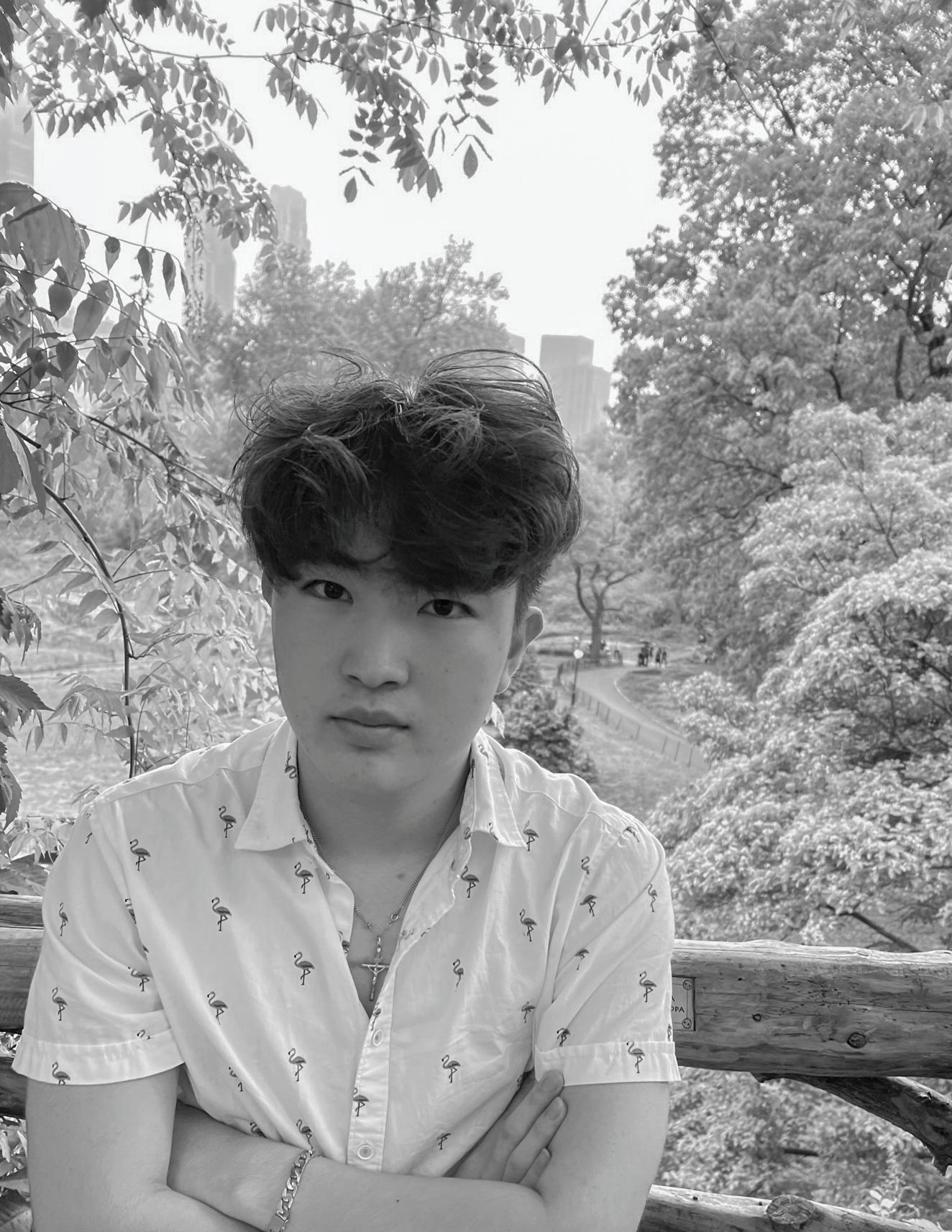
Matthew Hantgan
COLUMNIST COLUMNIST
Hwang’s column will cover a variety of individual reflections on race issues in America from the perspectives of students from all races, ethnicities, and cultural backgrounds. He hopes that his column will enable students to explore and think critically on the topic of racial injustice while providing students with a different perspective. He plans to feature Masters students and alumni.
Hantgan’s column will focus on the world of fashion. He plans to discuss the increase in trend cycles, the rise of small clothing brands, and the influence of social media on the fashion industry. Hantgan will interview Masters students on their personal takes on fashion and emerging trends. Additionally, Hantgan will discuss the process of building a personal style.
Tyler Hack Eli West BLOGGER
BLOGGER
I n this blog, Eli West will explore his interactions with various members of the Jewish world, dive into the Talmud and Torah’s perspective on homosexuality, and hopefully let other LGBTQ+ students know that there is a place for them within their religion. Despite this, the lessons he uncovers relate to everyone. He hopes that each person taps into a new or renewed sense of community, identity, and self-pride, and that his story empowers Masters students to remain true to who they are.
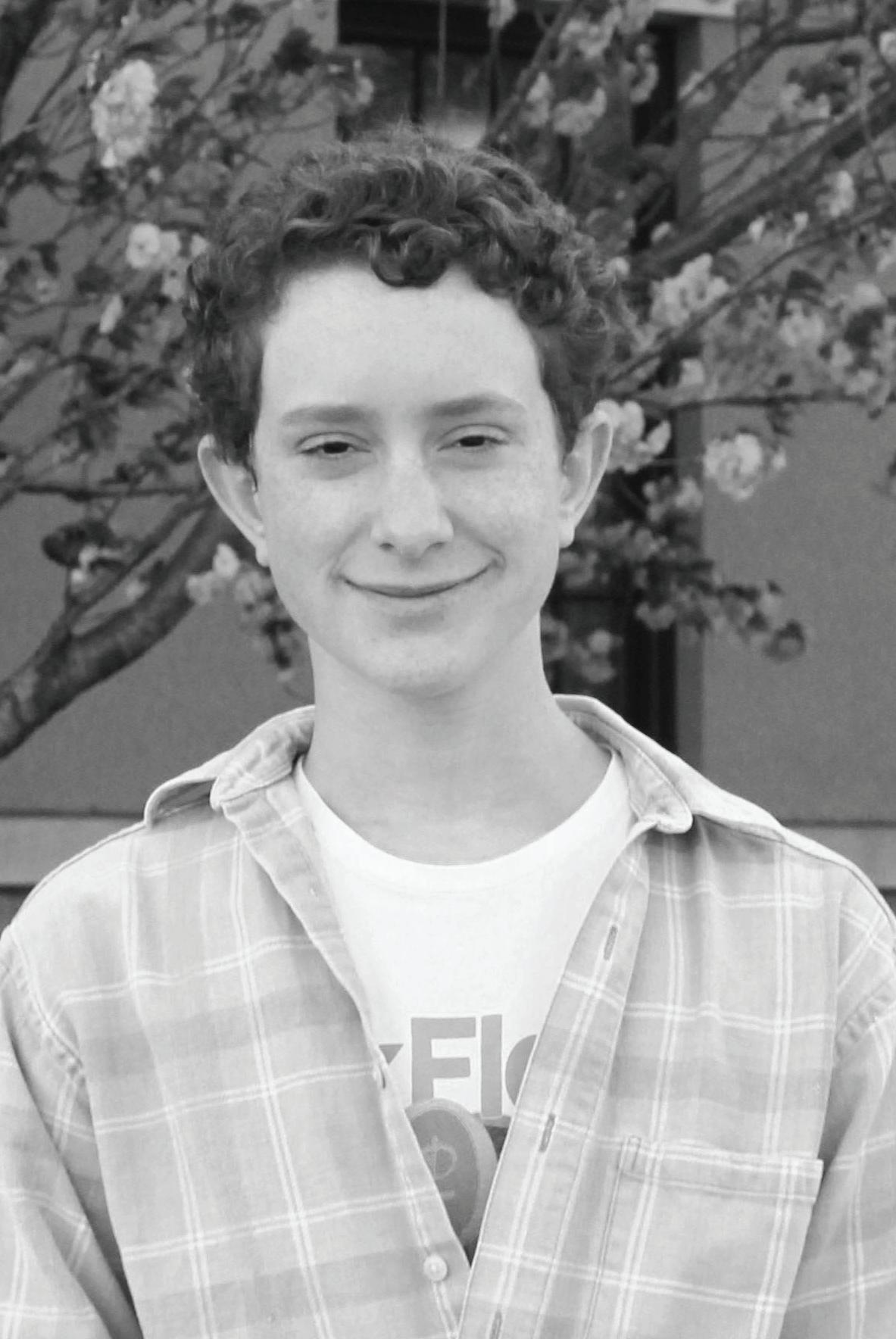
Tyler sees his blog as a platform to explore how Masters can better itself for its students and faculty, with pieces being in response to events at Masters — like the guest presentation on substantial equivalency — and regarding administrative positions toward activism — such as citing the climate strike as “political.” He will also explore pieces about how he believes the “cum laude” designation is unjust and how he thinks the school Board of Trustees should be revised. As a member of Executive Committee, he will tie pieces to bills he’ll propose later in the year but his goal for this blog is to create discourse around issues that aren’t discussed enough.
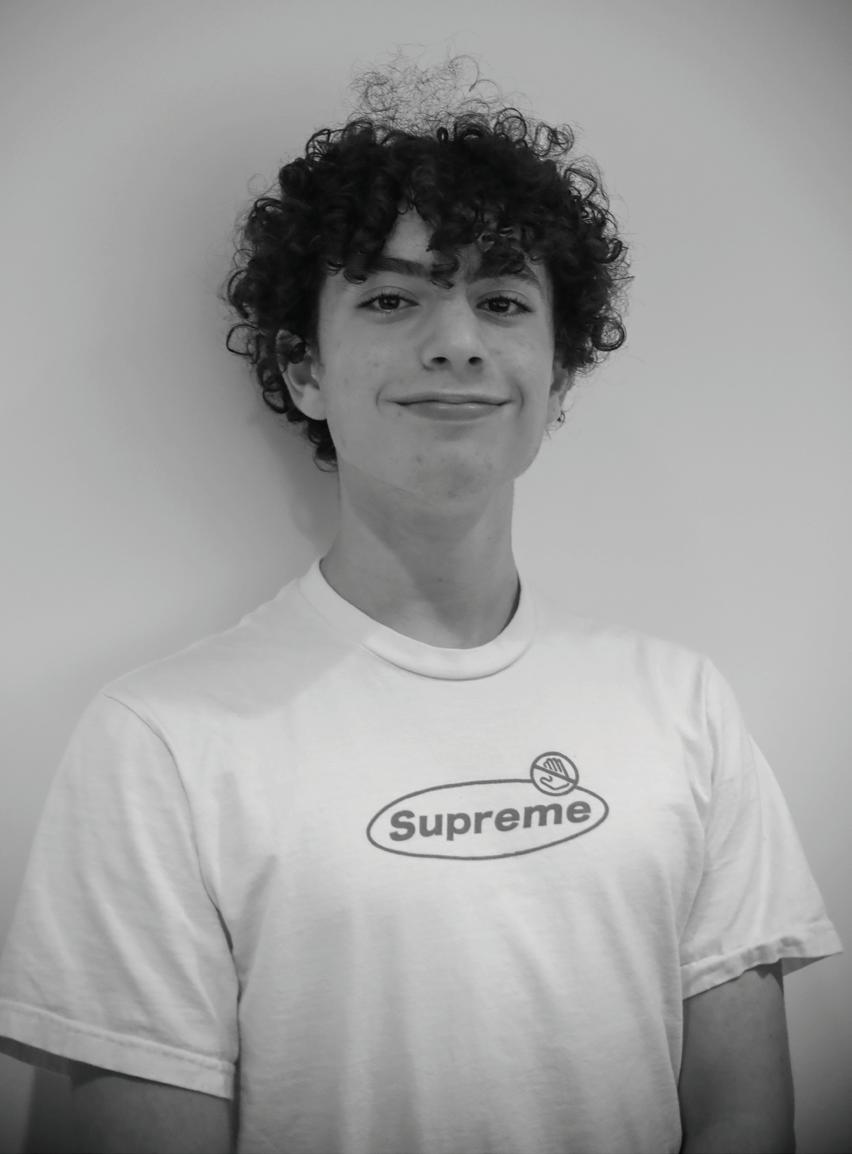
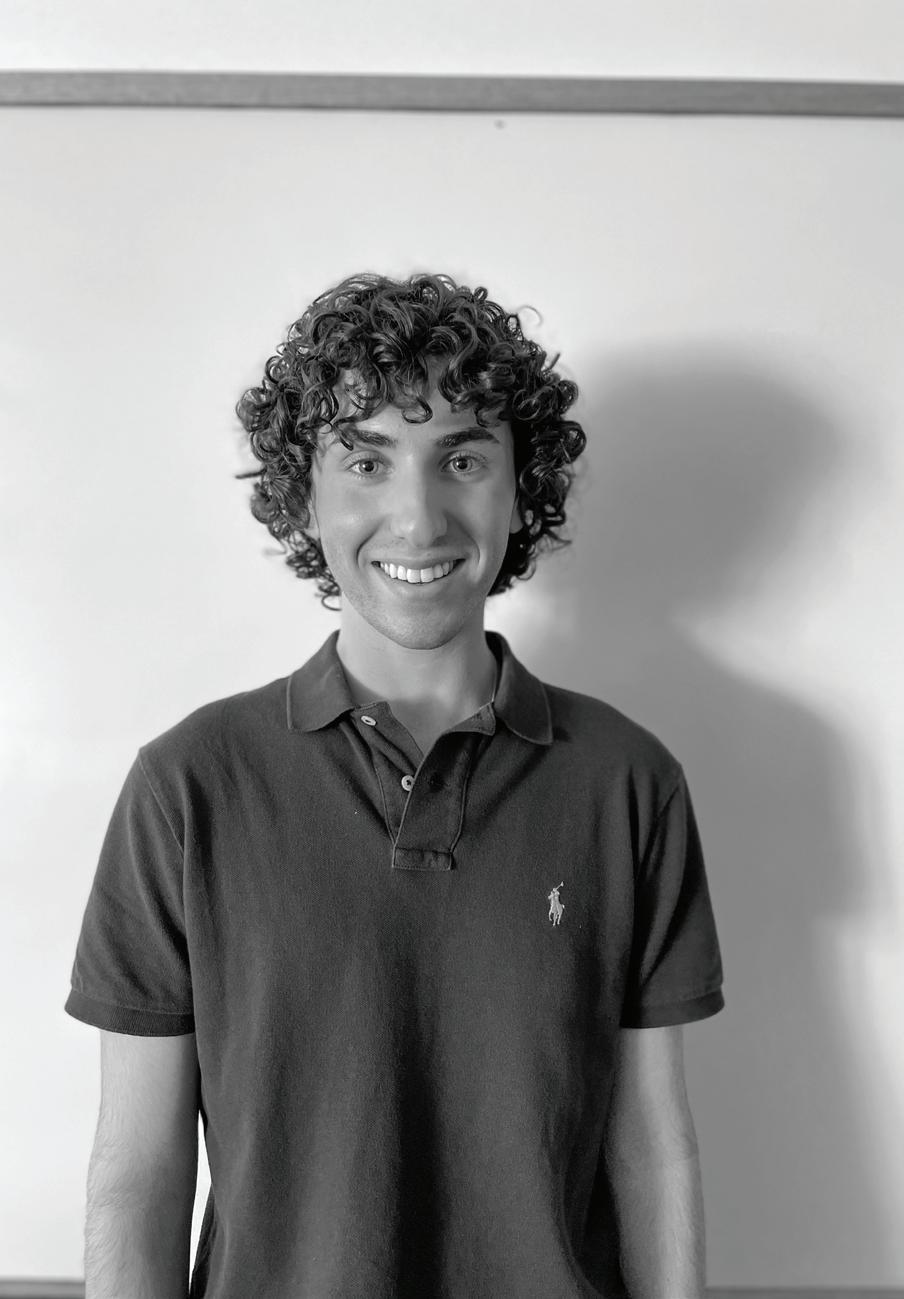
Standarized testing encourages learning... the wrong kind of learning
ALEX A MURPHY News Editor
Every year, hundreds of thousands of students fle into dimly lit testing rooms, where the sounds of ticking clocks and whirring fans are just loud enough to muffe quick heart beats, awaiting the ScanTron sheet that will help decide their academic futures.
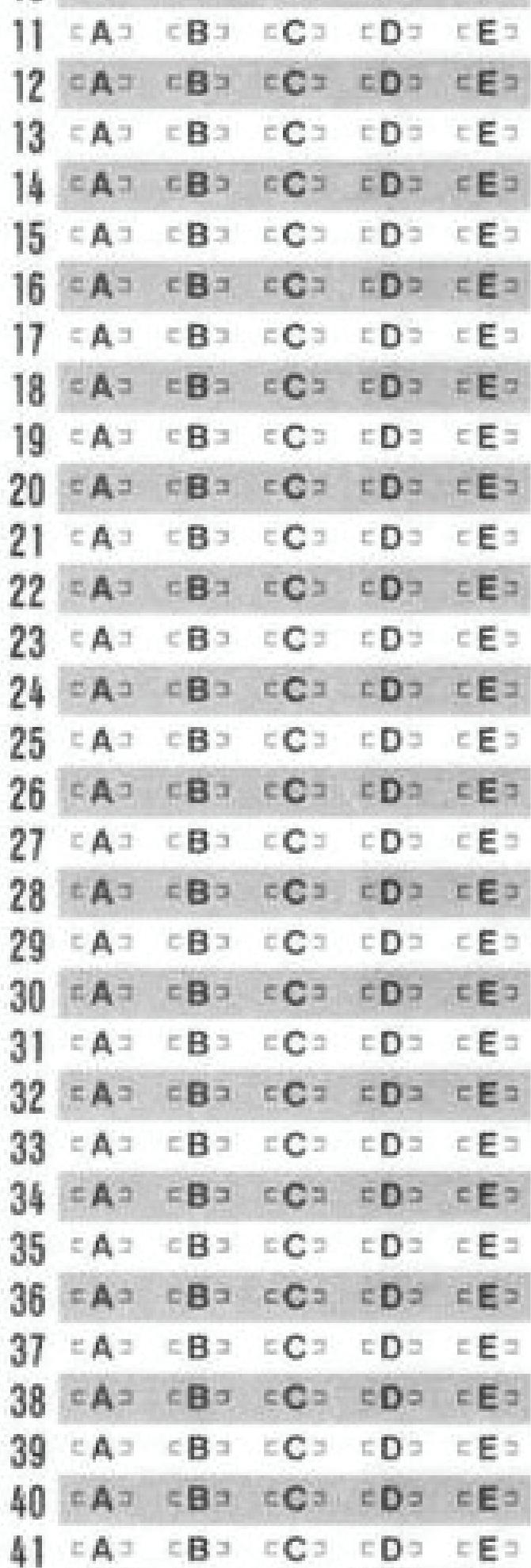
For upperclassmen, just hearing the acronyms “ACT” and “SAT” often yield a visceral response. Students cringe, or groan, or shift uncomfortably. It’s the same sense of dread that becomes plainly visible when one asks a Junior where they plan on applying to university. Standardized testing and college applications are two facets of high school that are simply too stressful to dwell on in our daily lives. More than that, they encourage a kind of short-term learning that favors a small number of very privileged students, and undermines the passion for learning that schools hope to instill in their pupils.
We as students assign excessive gravity to standardized test scores, despite its decreasing value in the college admissions process. The so-called objectiveness enforces the notion that one’s grade on the SAT is a measure of one’s overall intelligence, never mind the fact that standardized tests are only designed to measure academic value in a manner digestible for university admissions teams. On the SAT and ACT websites, the ratio of correct to incorrect answers as indi -
cated by a series of bubble letters is said to reveal one’s readiness for college.
This understanding of what it is that college admissions-based standardized tests measure tends to foster unproductive academic environments, as students obsess over how one arbitrary grade will reflect their educational performance after highschool. For students, the format of standardized tests does not lend itself well to missions promulgated by schools across the country, missions prioritizing critical thought, skill development, and perseverance.
“Throughout life you’re taught to have smaller incentives to build up to a larger goal, but standardized testing doesn’t support that sort of method that school teaches you otherwise,” said junior Eli Savage. “It’s weird and contradictory and puts a lot of pressure on students who are young teenagers.”
These young teenagers are impressionable, and to teach students to interpret their intellectual capacities in reference to a number out of 36 or 1600 means to limit their ability to grow as a learner.
The other day, I was faced with the choice to complete two hours of ACT prep or spend those two hours reading a Hannah Arendt book that had spent months collecting dust. I opted for the ACT prep, because I knew that it would serve me better in the short term. The other thing I knew was that my family can’t afford a tu -
tor, so just in order to be on par with many of my peers in the exam room, I would have to put in the extra hours.

That brings me to my next point. When colleges can discern a child’s entire intellectual value in one number, many families quickly realize that the only way in which their child can be accurately represented in applications is through extra tutoring and counseling. This is fine logic, and it speaks, more than anything, to a medium that prioritizes ScanTron-centric critical thought over real-life intellect.
These advantages thus create an academic hierarchy within the very top level of an existing academic hierarchy. We at Masters are extremely fortunate to be here. Just by nature of attending this prestigious institution, we as students represent the peak of educational opportunity in America. In accordance with this, shouldn’t we then expect to earn the highest test scores in America, sans tutors?
In reference to this, Adam Gimple, director of college counseling,
said, “There is nothing about our pedagogical approach as an institution that prepares students to sit for 3+ hours and take a standardized test. Our final exams don’t go for more than 90 minutes. So what is it about our experiences as an institution that is standardized in a way that is the equivalent experience of a standardized test?”
The test doesn’t care about the critical thought we’ve honed through years of Harkness discussions. The test doesn’t care that we’re restless for the 70 minutes we spend in history class, forget about three consecutive hours. The test wants us to train ourselves how to take it, not through reasoning and creativity, but through bubbling in the correct answer, and through sitting still for longer than any lecturer could talk in university. The exam demands very specific test taking skills only really accessible through textbooks distributed by the testing organization itself, or by professionals who have dedicated significant time and resources to understanding the
mechanisms by which the test grants you a clean 36.
Students do not need another arbitrary metric by which to rank their intelligence, particularly when this metric is merely a reflection of various forms of privilege and luck. If factors such as wealth, neurotypicality, and cultural background, can play a role in the number that appears on your SCOIR profile, perhaps we should consider a future in which we not only feel comfortable applying test optional—which many students already do— but in which we allow ourselves to rethink the way we conceive of intellect.
TOWER/NOVEMBER 4, 2022 OPINION 5
EUGENE HWANG/TOWER
ELLIE YANG/TOWER ANDREW MITCHELL/TOWER
AARON_ANDERER/FLICKR AARON_ANDERER/FLICKR
XAVIER ROLSTON/TOWER
Inside Mast s’ Unique Traditi
have evolved through time, but all of our traditions strengthen the unity of our community.
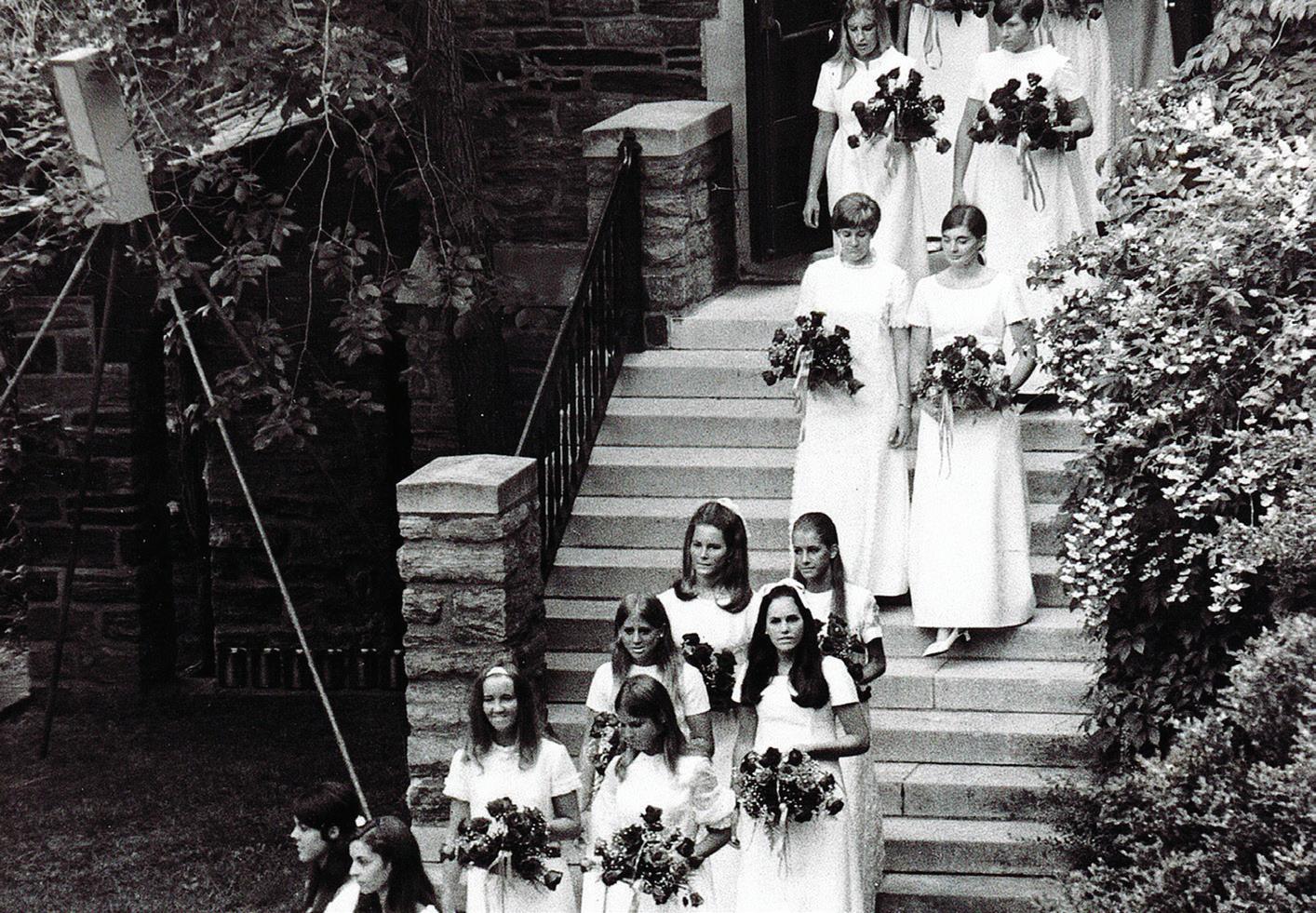
“Tradition! Tradition!”
As once said in “Fiddler on The Roof”. Masters is a place where its traditions are celebrated by the community. The creativity of our School sparked many unique traditions, some of which have stayed throughout the years, while others have faded away. Others
Upper School Dean of Students Jeff Carnevale refected on how this rich history makes the School as special as it is.
Carnevale said, “Every school has their own unique set of traditions that highlights who they are. I think Masters is who we are because of where we’ve been in the traditions
As students go through the school year these days, they will often communicate to their peers via phone. Before technology was so accessible and everything was on our phones, Masters Hall held the A-Z board.
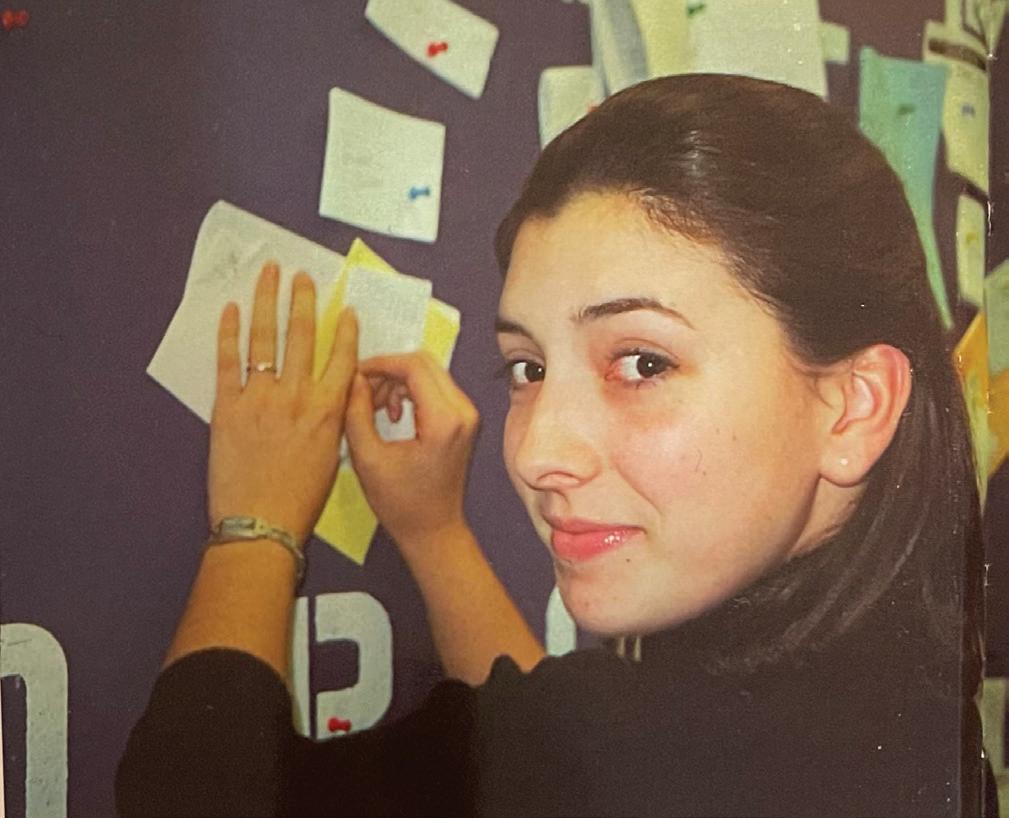
“Before cell phones and email we had a Board in Masters Hall called the A-Z Board and you could leave notes by the letter of someone’s last name. On game days captains would leave bags of candy for teammates.
we have. I don’t think that it can be replicated in the same way at another school.” He continued, “Our Halloween traditions highlights the quirkiness at this school and all its unique glory. As for Great Gig in the Sky, it highlights the arts in a different way than most schools. For all these traditions, it’s the way in which we gather that make them so special.”
Like many other schools, Masters has traditions such as Pack the

Faculty could leave notes for students etc,”said Jaggi. Now, the board holds less of a practical purpose and instead is a way for clubs to share their schedules and events. On occasions, letters and notes can still be seen, a call back to the board’s traditional use.
This tradition is an example of not just evolution but it actually faded away.
Hall een
Likewise, Masters does not take Halloween lightly. Even a month before Halloween, the halls will be flled with spooky decorations. Every year, there is a Halloween video competition among the grades/departments in the Upper School, although it used to be Halloween skits back in the day.
“I think the tradition of the Halloween videos is really special. It allows for the entire class to come together and work collaboratively on a project,” said sophomore Juan Torres.
He continued, “It’s something that brings our grade together as a whole, because we have a responsibility to complete something for the entire community to see in the end.”
Upper School English teach
Cruz said, “I have a bigger perspective on all the work that my teachers put in to keep these traditions alive and make it fun. It was always a funny moment to see my teachers weren’t the strict people who gave me detention, making fools of themselves.” She did note one key difference though. She said, , “To, at least in my experience last year, there’s defnitely more use of technology and flmmaking than there was when I was here. A lot was done on stage.”
Alumna ‘01 and current Director of Alumnae Engagement, Sujata Jaggi has seen the Halloween rituals alter through her years at Masters. She said, “Halloween has evolved through the years. When I was a student in the 1990’s, Halloween
Seni Speeches
Senior Stella Simonds has been looking forward to her senior speech since freshman year.
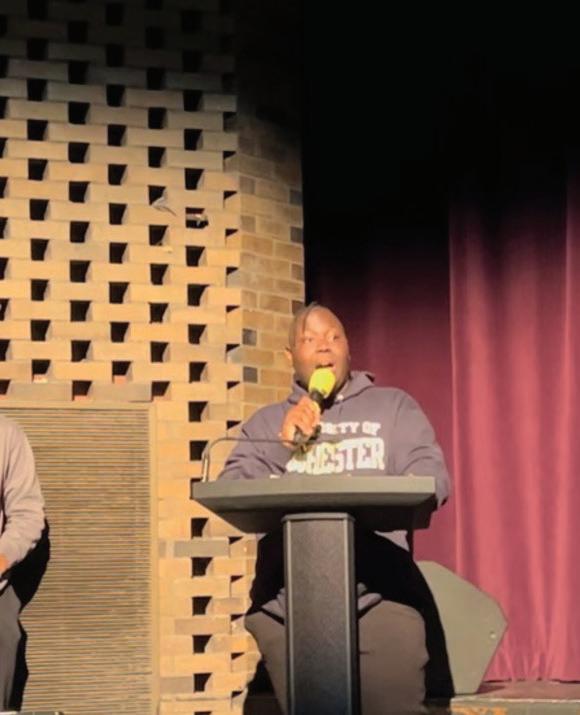
“I can still remember a lot of the seniors and what they spoke about when I was in ninth grade. It’s a special tradition that allows seniors to share their Masters experience. I’ve been planning the ideas for what I want to say since I was in ninth grade.”
Simonds said, “It’s pretty unbelievable that I’m already a senior and I’m already going to be like the one doing the senior speech, but I’m really excited to do mine.” She added, “I hope people remember mine and at least take some advice to heart, how I’ve taken
from other people’s speeches.” Alumnus Leo Psaros ‘17 echoed the sentiment. “I think it’s a unique tradition. When I tell most people outside of Masters that seniors have the opportunity to share [their thoughts] for fve minutes with the community about their time at Masters, they are always envious. I believe it’s a nice gift from Masters to give every senior the special chance to share their story,” he said, “Because Masters requires juniors to take public speaking, senior speeches are a great opportunity to take the skills you learned junior year and put it towards something you are passionate about.”
Den (a rallying of fans for a particular game) and senior privileges. However, Masters has certain traditions that are distinctive from many other high schools.
Here, Tower takes a look at some of these Masters-specifc customs chronologically throughout the school year, recognizing how some have evolved, emerged or passed away.
F nd ’s Day
Although beginning in 2004, Founders Day honors the founding in 1877, according to Alumna ‘01 and current Director of Alumnae Engagement Sujata Jaggi. Everyone in the community gathers in their respective team colors. Generally, this is a day where faculty awards are given, and the entire school body, from grounds keepers to faculty, from kitchen staff to administrators, all gather together to remember our founders. Each grade and faculty participates in a tug-of-war between the two teams within their
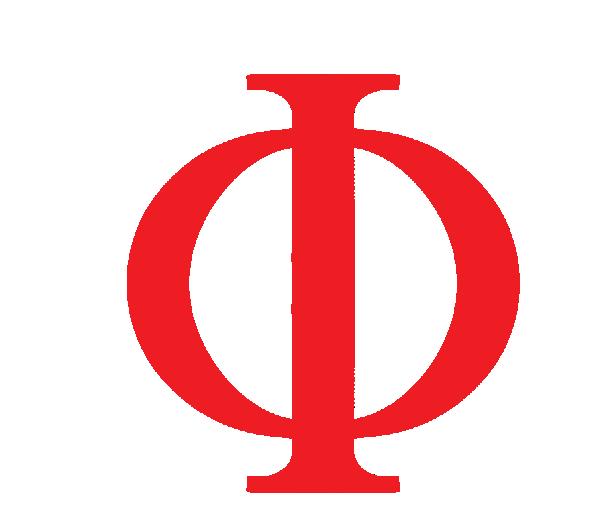
grade, and at the end of the day, scores are tallied. Students and faculty are assigned a team for their time at Masters; Delta is navy blue and Phi is red. Why red and blue? –when combined, they make purple, our school color.

Sophomore Rebecca Troy said, “I think it is an event that brings everyone of Masters together as a whole community. The friendly competition connects people from different grades together when they fght to win.”
M ning Meeting
DOPA Days
Once a month, students have a different type of morning meeting that they are not used to seeing every other day: a DOPA Day. This is an opportunity for anyone, no matter the talent or experience to sign up and perform in front of the Upper School during Morning Meeting.
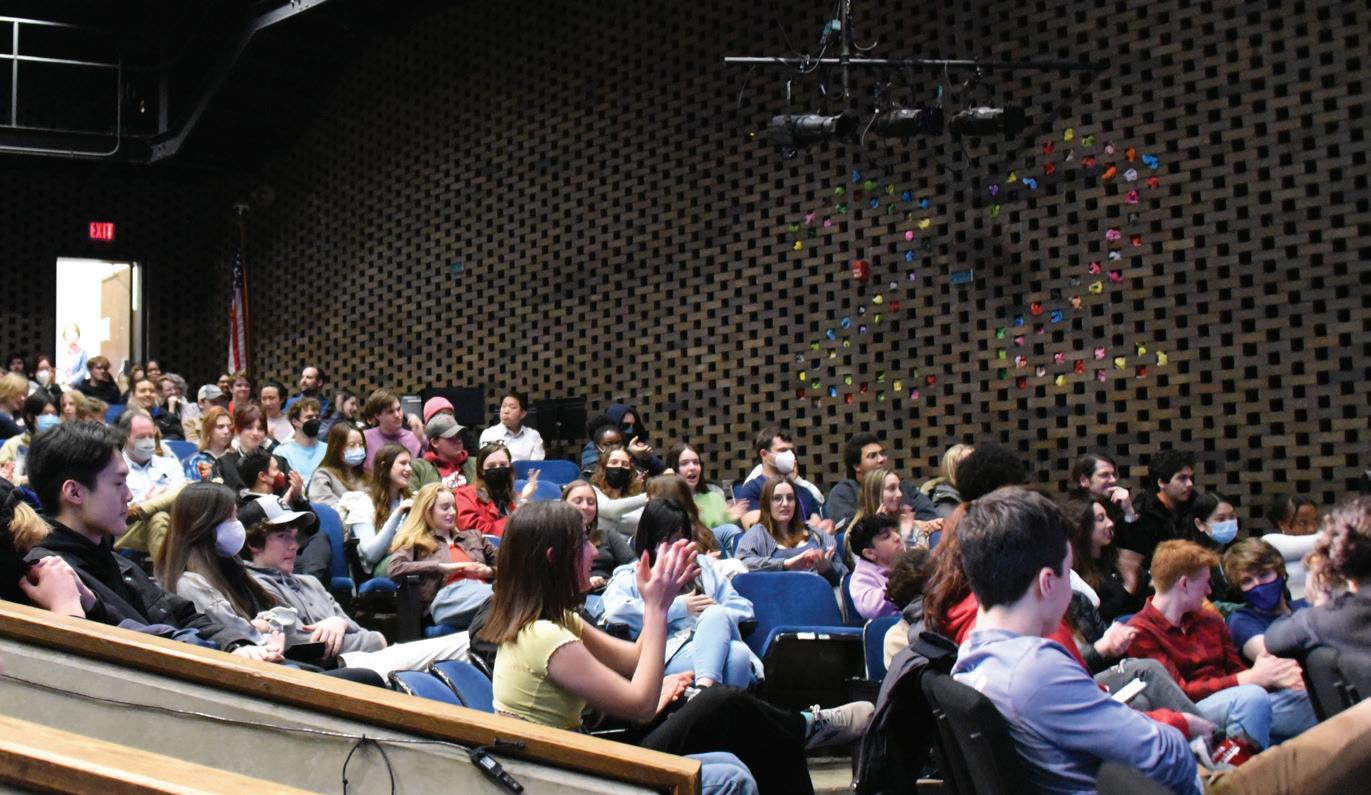
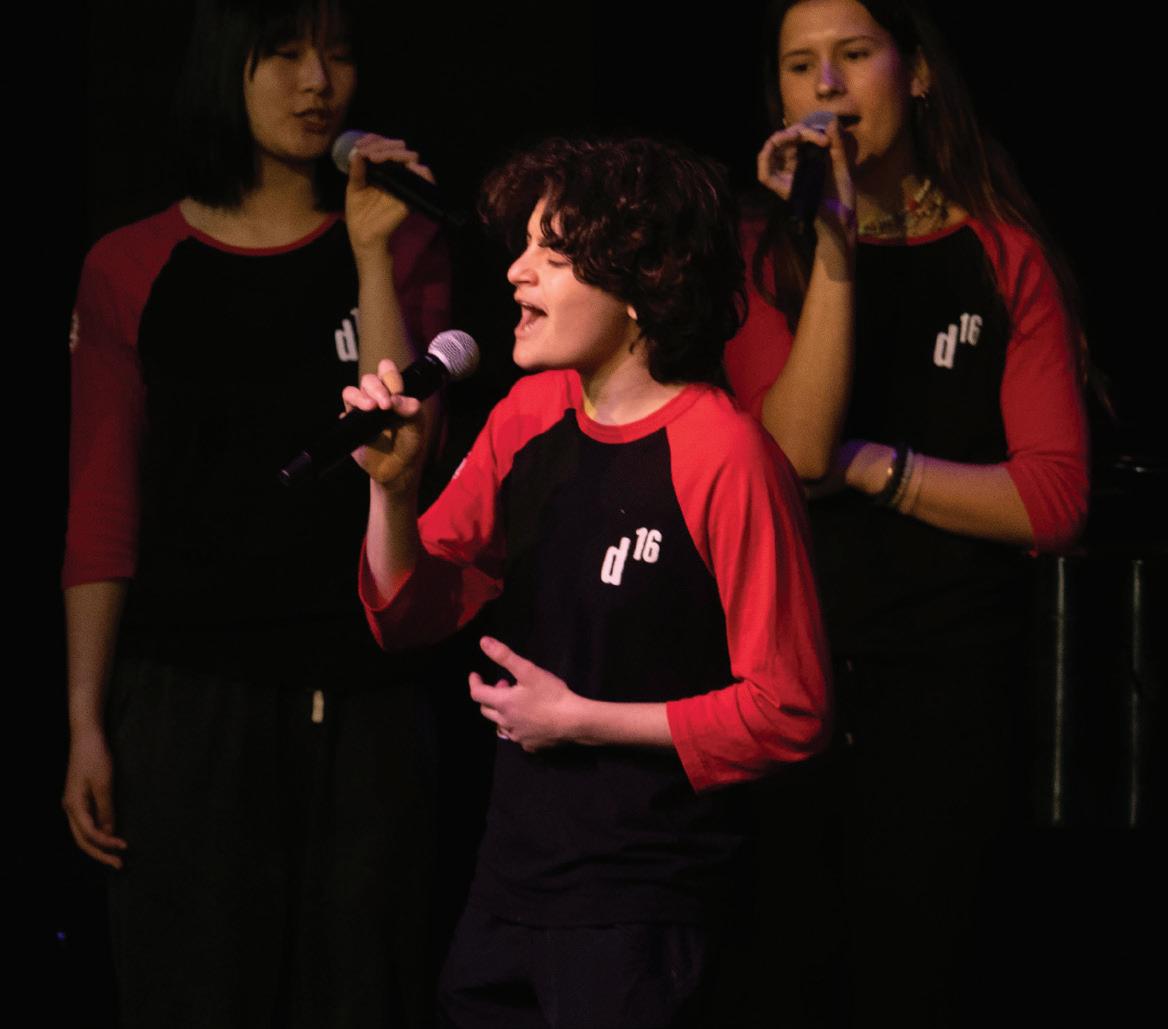
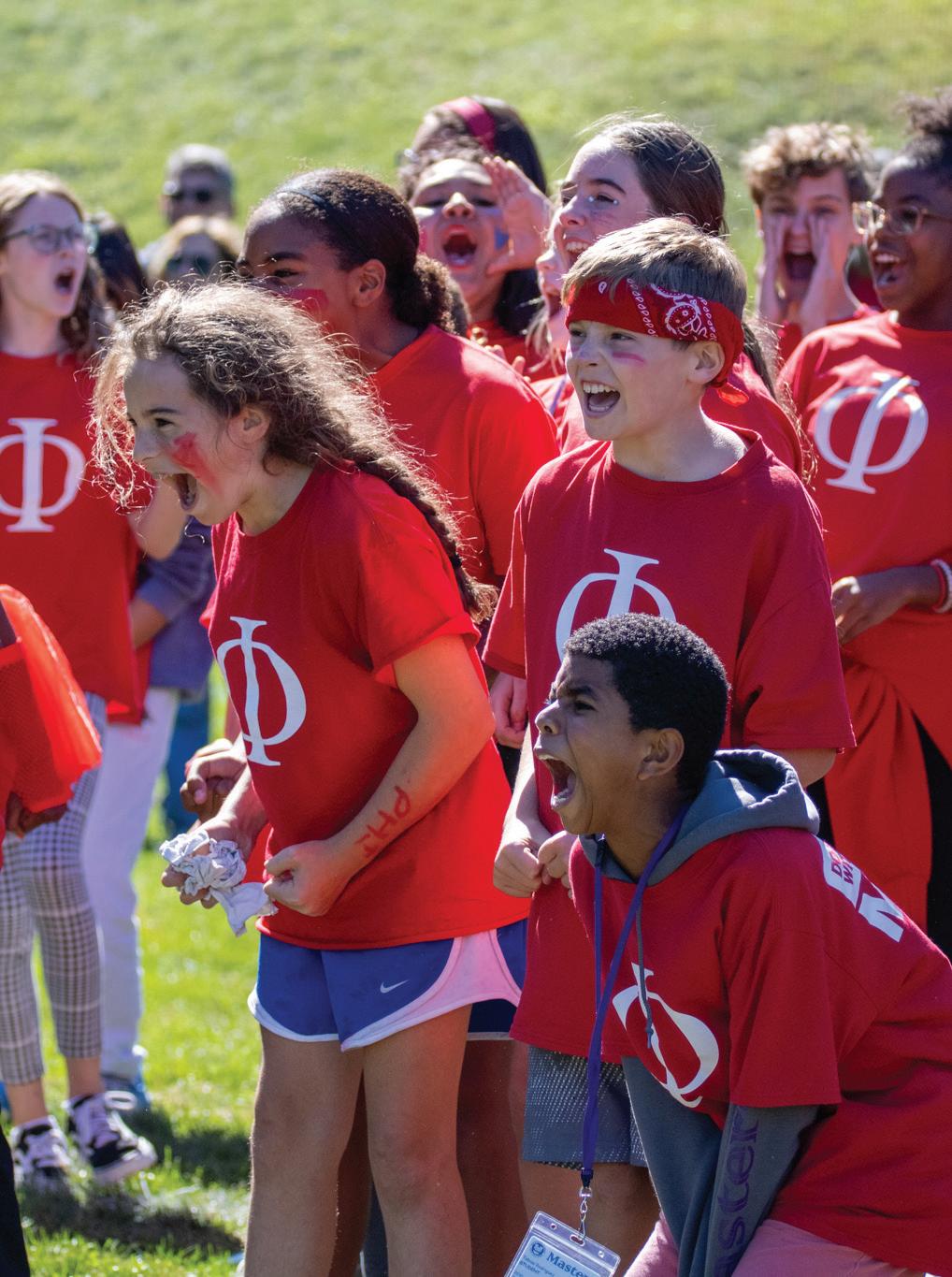
Junior, Teddy Meyer enjoys performing and observing performances. He said, “Opportunities to perform at other schools are hard to come by and DOPA day makes it very accessible and open. It also changes up the rhythm in listening to people speak for thirty- minutes or presenting.”
Seni Steps
all eight years and I waited for the bus by the senior steps everyday. I was always told never to go on the senior steps,” said Psaros. He continued, “It was a very surreal feeling. I walked down the steps for the frst time, and it was my last year at this school; my time had actually come to an end.”
6 FEATURES TOWER/NOVEMBER 4, 2022
Alumnus Leo Psaros ‘17 attended Masters since ffth grade. Even after graduating from college and beginning a job, he still recounts a Masters tradition.Traditions come and go, the idea that the senior steps are forbidden until graduation is a discontinued tradition. “I went to Masters
A L
s
Features Editor LILY ZUCKERMAN
k
d
A-Z Bo
Currently, the Upper School gathers every other day for Morning Meeting. Besides presentations, Morning Meeting includes Senior Speeches, Matters of Spirit and DOPA Days( formerly called Musical Mondays) practices that many look forward to.
JOSH MARKOWITZ/TOWER
RYAN GUAN/TOWER
JOSH MARKOWITZ/TOWER
MASTERPIECE
JOSH MARKOWITZ/TOWER
Take
at
MAISON MCCALLUM/ TOWER
MASTERPIECES
a look at the photo gallery including these
photos and
more
under Lily Zuckerman’s
article
tower.mastersny.org
Mainstage celebrates Chinese culture in its adaptation of “Journey to the West”

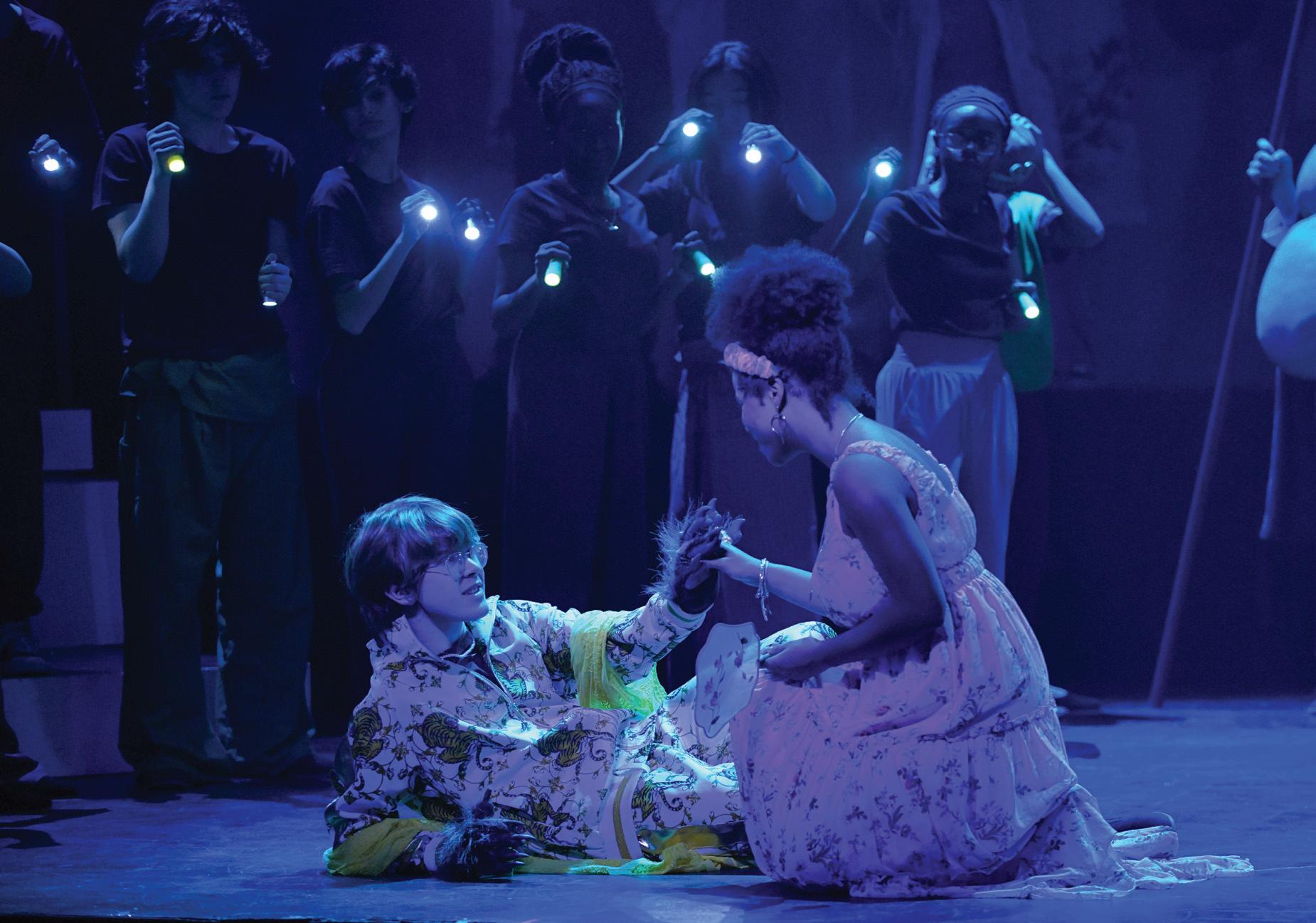 Sokolenko Staff Writer
Sokolenko Staff Writer
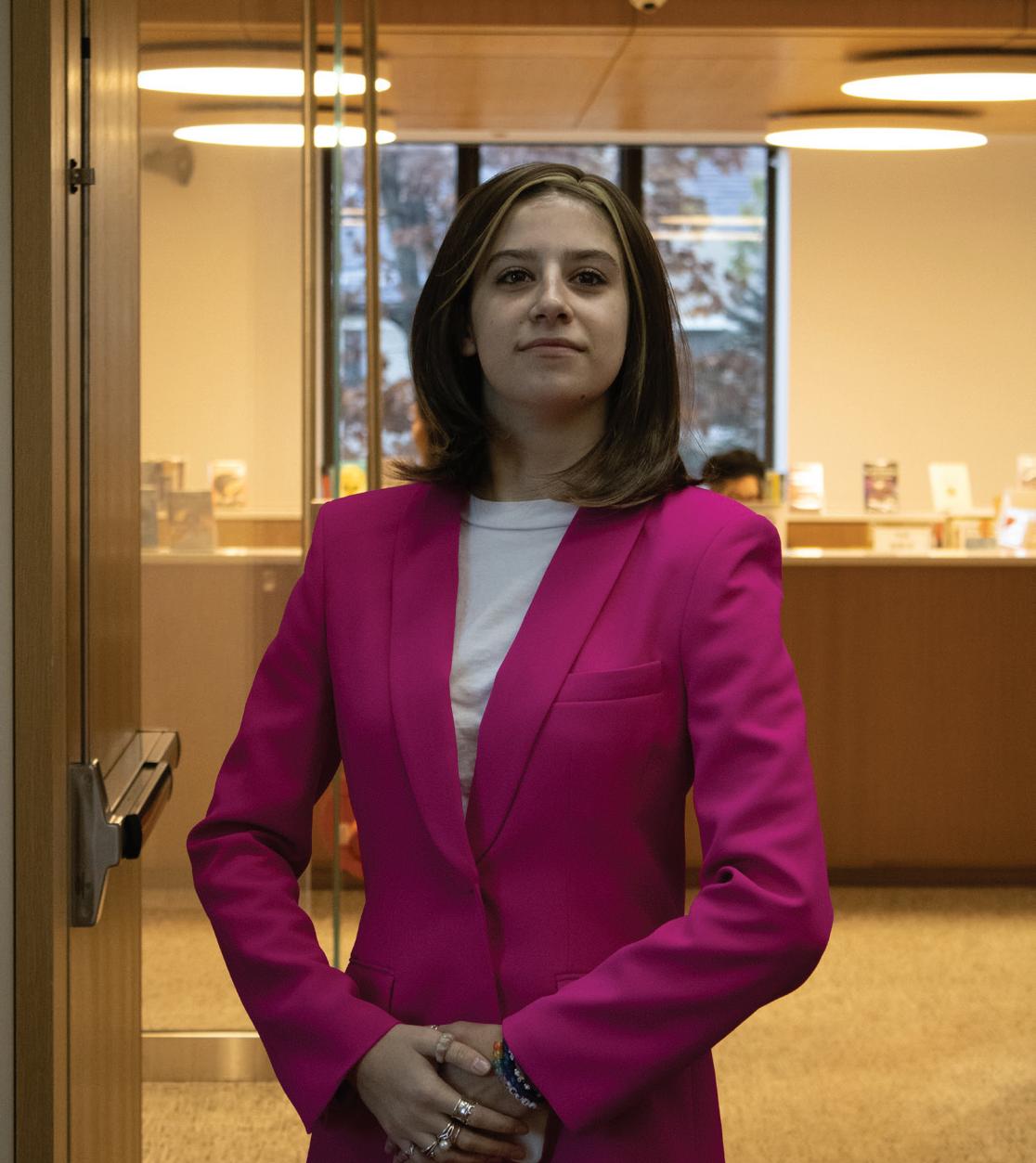
“ Journey to the West”, a beloved fantasy story from China, finally came to Masters. The mainstage production presented their adaptation of the story to the school community last week.
Meg O’Connor, Upper School theater teacher and director of the play, credited the idea to former Masters student Zara Zhang, ‘22. For Zhang and many of the other Chinese students who grew up listening to or watching the story, “Journey to the West” is an essential part of their culture and considered one of the most well-known books in China with adaptations produced almost every year.
O’Connor said, “There’s a long tradition in China of taking aspects of the story and changing it and adapting it. So we are
century novel attributed to Wu Cheng’en combines adventures, humor, spiritual and fantasy elements. It tells the story of Buddhist monk Sanzang who has to overcome 81 ordeals on his journey to find the sacred scriptures. For the characters, it is also a personal journey towards enlightenment and inner peace.
Before coming to Masters, O’Connor had already worked to direct “Journey to the West” in another school. The script was then based on the literary adaptation by a famous American playwright Mary Zimmerman. O’Connor recalled that many Chinese students in the school felt that Zimmerman’s adaptation missed some of the most important characters. This year, while working on her own adaptation, O’Connor drew from that feedback and collaborated with Zhang and other Chinese students in the school to make sure that the play actually felt like an authentic telling of “Journey to the West”.
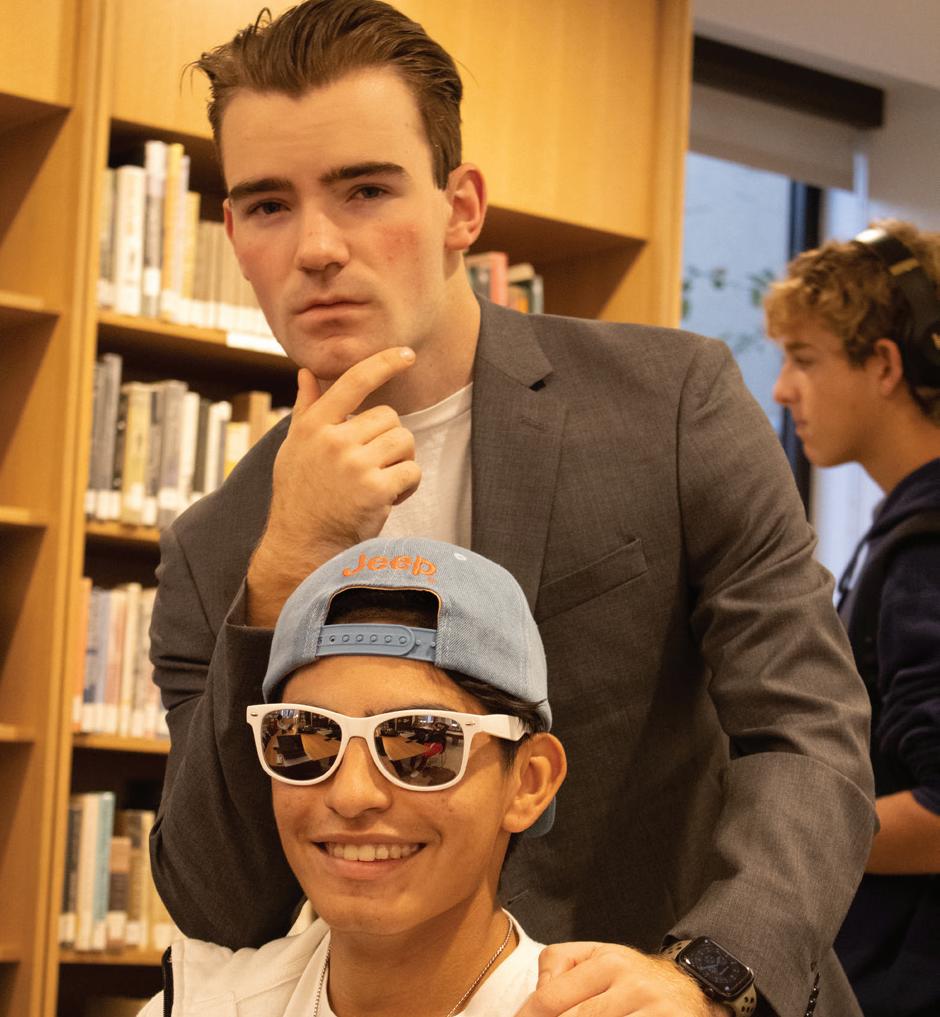
Despite having to simplify some plotlines for the time’s sake, O’Connor worked hard to preserve the story’s traditional spirit and make it engaging and comprehensible for the modern American audience. She read about five different English translations of the book and worked closely with her students as well as friends and relatives to make sure that the script represented the book’s most important elements. To better reflect the author’s writing style and the story’s tone, she also
watched a famous “Journey to the West” mini-series.
“I spent a lot of time watching that to understand the Chinese humor, because there’s a lot of very slapstick humor. It’s very physical, it’s very over the top…” O’Connor said. “In addition to all of the comedy, there were also moments where I wanted to incorporate poetry, because the original is very poetic in its language. And then for the portions where there’s actual Buddhist text, there are several sutras in the script that are taken from the actual text.”
Jessie Xie, a Chinese student, who played Sanzang and helped to bring the play to life, said that they wanted to get people interested in the show by presenting how those modern elements play into the ancient texts.
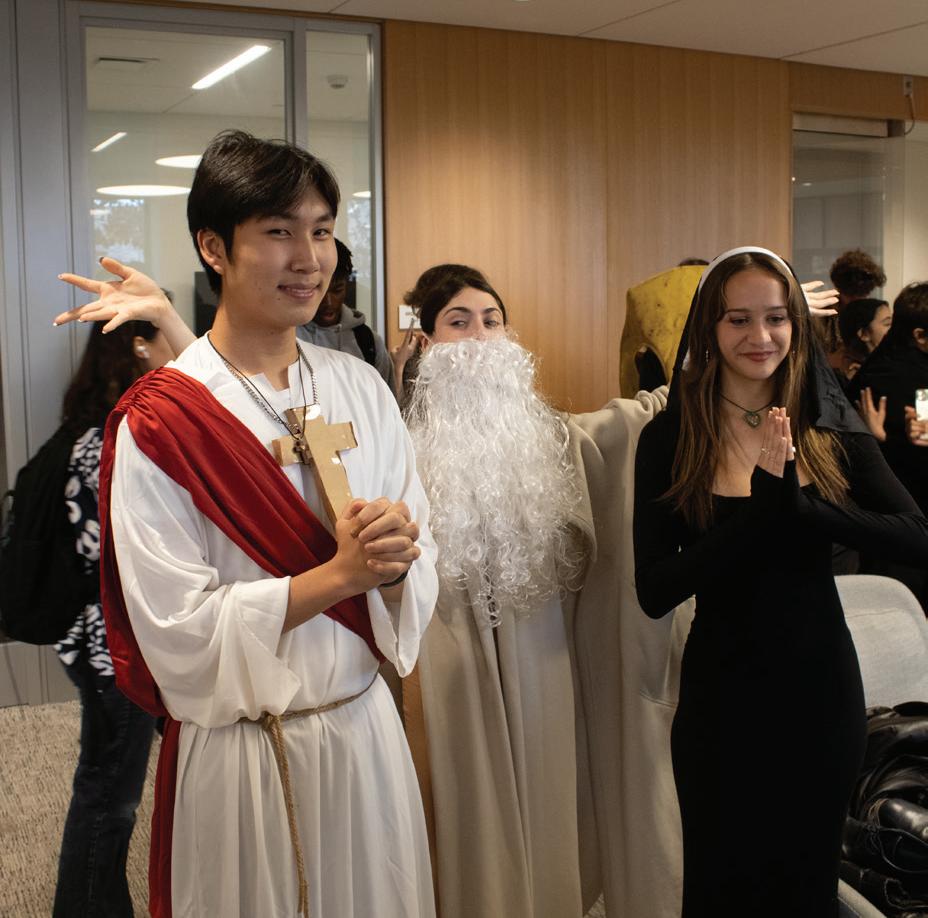
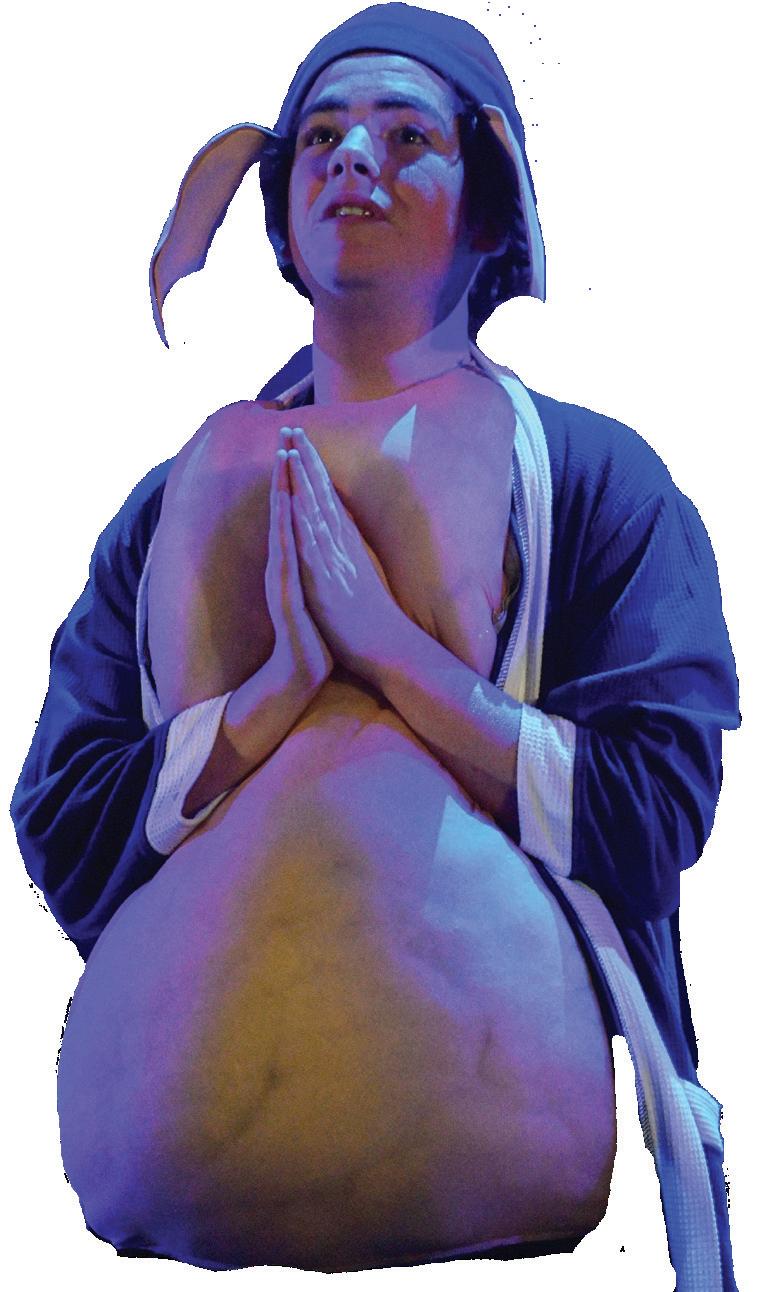
Besides the script, O’Connor has also worked alongside several students to design the show’s costumes. Considering that the cast is mostly American, the mainstage had to make sure that the costumes represented the culture in a respectful way. Since the characters’ dialogues were modernized to fit the twenty-first century, it also did not make much sense to have the characters in overly old-fashioned clothes.
“Our costumes are a very strange mix of modern and ancient and Chinese and American, which is sort of like our theater company. We’re a mix of so many different cultures and different countries,” O’Connor said.
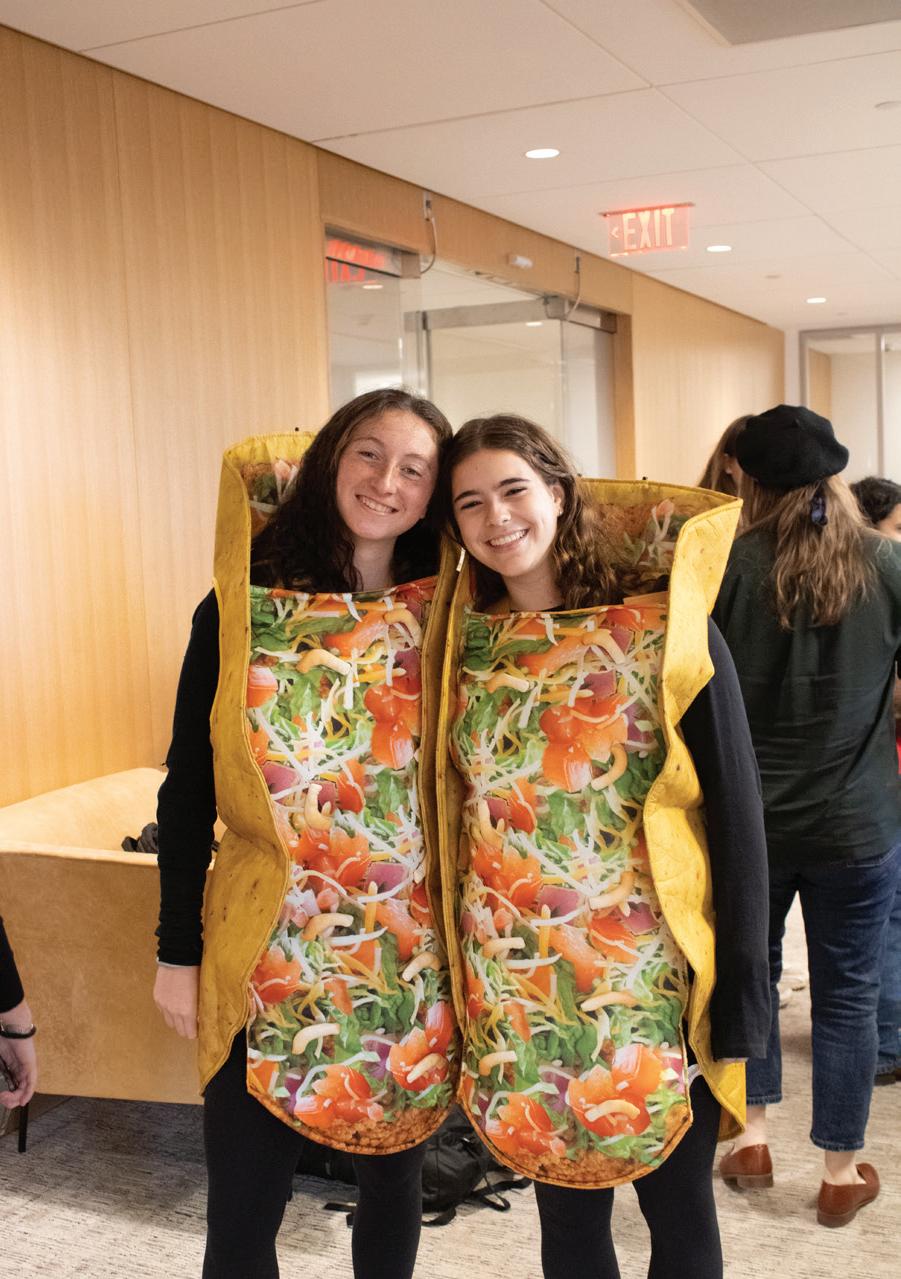
Amaris Asiedu, an American student who played Sha Wujing and helped with the costumes, said she tried to incorporate more modern Chinese elements to be respectful. For example, she researched the silhouettes from modern subcultures and the dynasties relevant to the story for inspiration and included red as the color of luck in the clothes of pilgrims.

Since the show is abstract in terms of its time and setting, the tech director Peter Wylie tried to create an environment that could
work with different plot lines but still gave some signification of the Chinese heritage.
“The most prominent things that we see are the headers, which are an adaptation of what we see in Chinese rooflines of that architecture and time period,” Wylie said. “And then bringing in elements of the Chinese lanterns. And then the banners that we worked to … pull from the types of Chinese nature one would find, for example, bamboo leaves.”
Besides constructing the set, the mainstage also worked with the cast to make sure that they correctly represented their characters. Since the play decided to use the characters’ original names instead of American translations, a group of Chinese students helped the actors with pronunciation.
For many Chinese students, “Journey to the West” is a part of their childhood. That is why it was really important for Mainstage to
correctly represent the story and not disappoint their international audience.
“Making sure you hold it up to the standard without making fun of the culture is a really important thing,” Asiedu said.
Reflecting on this experience, Xie said she felt really proud of all the hard work put into the produc tion to get the original idea down and to make it creative and fun for the audience to watch. Despite the concerns of possible cultural appropriation, she thought the play is rather a homage to the culture.
Xie said, “I feel like we come from a good intention, because we were trying to preserve and present this cul ture that we’re proud of and want to correctly represent.”
School takes Halloween spirit on the road


This year, the senior class decided the overall theme for Halloween as “Road Trip” and each department was assigned a different theme. The History/Religion Department had Massachusetts, the Visual Arts Department had California, and etc. One of Masters’ traditions is that seniors are not designated a certain theme so they can dress freely. In addition, each department has to make a Halloween video according to their respective theme.

Pictured:





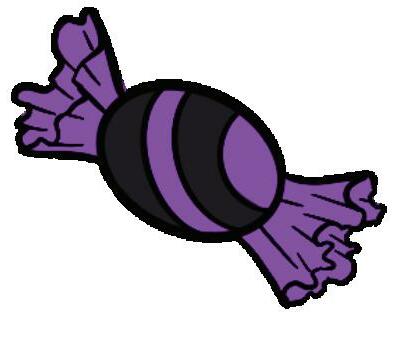





Photo 1: Dayan Battulga ‘23, Giselle Meskin ‘23, and Sophia Semczuk ‘23 (from left to right).
Photo 2: Austen Smith ‘24 and Baruch Hidalgo ‘24 (from up to down).
Photo 3: Amelia Von Jan ‘23.
Photo 4: Hannah Schapiro ‘23 and Stella Simonds ‘23 (from left to right).
Photo 5: Alexis Estime ‘23, Kuorkor Ashie ‘23, and Rachel Mafuru ‘23 (from left to right).
Photo 6: Zahali Vauclena ‘23 andVelizar Lazarov ‘25 (from left to right).
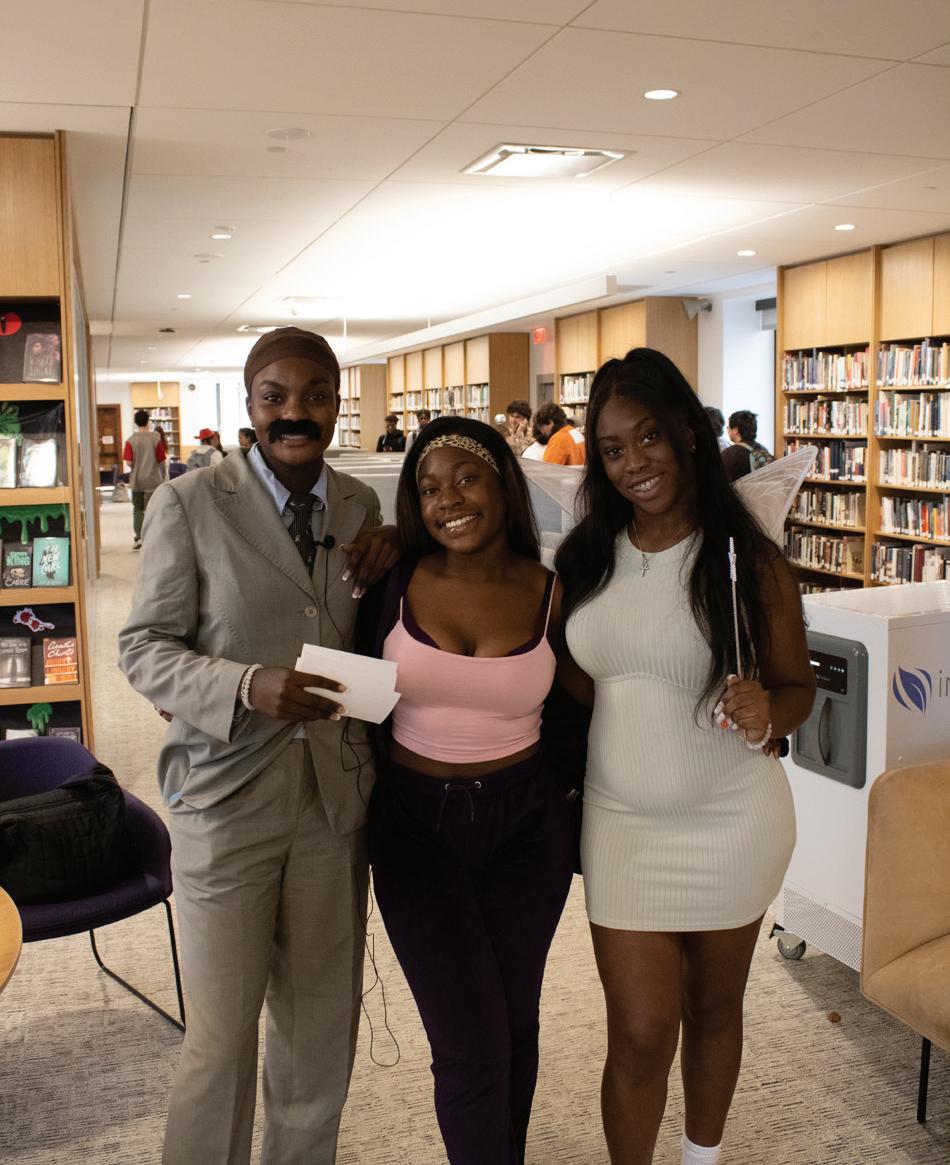
TOWER/NOVEMBER 4, 2022 FEATURES 7
Viktoriia
Photos by: Meg O’Connor
JAKE LEFORT ‘23 AND MORGAN Young ‘23 cast as Yellow Robe Demon and Princess respectively performed last week for the Masters community. Thanks to the humorous dialogue, interesting lighting effects and great acting, their scene was one of the most memorable in the play.
JOSH MARKOWITZ/TOWER
Jenny Xu
CAMILO BITAR- RACEDO ‘24 plays Sun Wukong who accompanies Sanzang on his journey to get the scriptures.
3 2 5 4 6 1
Lot rage: The war on park ing
MAIA BARANTSEVITCH
Editor -in- Chief
On the first day of my senior year, I jumped in my car excited at the prospect of driving to school after years of being stuck on the bus. As I pulled into the parking lot that is, supposedly, dedicated to the senior grade, my enthusiasm quickly diminished. I made sure to arrive early to ensure a good parking spot, but to my dismay the lot was completely filled by the early hour of 8:03 a.m.
At the corner of Masters Hall and the school’s tennis courts lies the well known “Senior Lot”. It is a space on campus that gives seniors a designated area to park, and helps avoid student cars filling up other areas of campus such as the Fonseca Center and Middle School parking lot. But an ongoing issue regarding the Senior Lot is that there are many juniors and faculty taking these spots, leaving seniors to find parking elsewhere.
The reasoning behind this anger is not purely due to the expectations of senior privileges, it is also a space that the security team monitors to ensure senior use only. All twelfth graders who bring a car to school are expected to register their car with security and place an idenifying sticker on their car. This helps the school make certain that only seniors are parking in the lot, but this rule is often ignored or avoided.
Aimee Ayala, the senior class president, agrees that the monitoring of the senior parking lot can be precarious when not all cars are registered. “The process of registering your car is quite vague, and as class president I should probably be informed of it. How-
ever, I have no idea,” Ayala said. There is also the issue of faculty and student parking relations. It has been made clear by administration that students are not allowed in the Fonseca Center (F.C.) parking lot as that is reserved for faculty only. But quite often, the F.C. lot is not full, but the senior lot is.
Ayala has noticed this pattern as well. She said, “It’s a big problem with faculty cars, which is understandable because there is a lack of parking for our faculty. But it’s frustrating because students aren’t supposed to park in the F.C because that’s for faculty
only, yet the lot that is meant for faculty is never full and our lot is.”
Masters has an additional gravel parking lot near Estherwood Mansion that students and faculty are allowed to park in. Since juniors are not allowed to park in the senior lot, they are allowed to park there as a last resort but are encouraged to park along Clinton Avenue. However, many juniors do not want to trek up the hill to classes, or are uninformed about their rights to park in that lot, leaving them to take spots that are meant for seniors.
There are two obvious solutions to this dilemma: expand the
senior lot or enforce the monitoring of the lot and registration of cars. I understand the time, money, and maintenance needed to expand an entire lot which is why the latter is a more reasonable solution.
The monitoring of the senior lot does not begin until around the first week of November. Students, faculty, and on-campus residents are still applying for parking permits. The permits come in three forms:one is for students, one is for residents, and the final is for faculty and staff. Each permit is color-coded for each category, which helps security monitor who is parking where.
Director of Security, Victor Seguinot, has been a parent at Masters for eight years and has been working with the school for two and a half years. Seguinot works with students,faculty, and on-campus residents to help register their cars, and monitor the senior parking lot.
The first step in weeding out unregistered cars will be putting a warning sign on cars that don’t have the parking permit sticker on their windshield letting them know they are illegally parked.
Seguinot understands the entitlement seniors feel when it comes to parking at school.
“Seniors deserve that tradition. Some seniors have been here since middle school, and that’s one of the perks that you should be able to get here,” he said.
It is difficult to determine whether a car is owned by a junior or senior when not all seniors have a registration sticker. Having a harsher approach may be necessary to ensure that the only students parking in the lot are seniors with stickered cars.

Unfortunately the consequences for students without permits have to be dealt with by administration, not security.
Seguinot said, “It is harder for us from our end, you know, the administration has to communicate with them because when it comes to punitive measures in the school, security is able to report it but it’s really up to the administration to sit down with the student and explain the consequences.”
Although this is a problem that many current seniors find frustrating it must be remembered that student parking is not a priority for the administration. The school has bigger issues to worry about than finding a spot near campus or having to trudge to class from Clinton Avenue. But something as simple as an explanation and announcement of how to register your car as a student will help security ensure senior parking only, and avoid students getting ticketed. Monthly reminders and clarification of the consequences students will face if their car is not registered, or if they are not a senior, can also be a useful fear tactic in ensuring seniors have a spot every morning.
This may seem like an insubstantial issue, but it is one that can be so easily resolved, and one that can minimize the discontent of students towards the administration.
Language requirement speaks with a forked tongue
Features Editor
Masters encourages its students to have expansive academic experiences away from its New York campus. It has affiliations with different semester and year long study programs which students apply to. One of the more popular programs is School Year Abroad (SYA). Masters also has a language requirement stated on their website: “Languages: Three years of high school study, in the same language, through at least level III.”
Jennifer Hughes, a Spanish teacher at Masters encourages language studies abroad. “I strongly recommend studying abroad in high school. If you get the chance, do it! It is a fantastic opportunity,” said Hughes.
Masters should make its students feel constrained by its language requirements.”Halprin said she was upset to be taking Spanish at Masters. She feels proficient in Italian and wants to continue her studies to become even better at Italian outside of school. She added, “I feel like Masters is not taking into account my progression in a new language. They want me to pick up from the same place I left sophomore year, even though I have grown in other ways. They don’t understand or acknowledge that.”
Graduation requirements exist to ensure that students
the school recognizes its students' experiences and accomplishments.
Filippo Biscetti, a resident in Viterbo, the city that the SYA Italy campus is located, said, “In highschool I studied four different languages: English, Spanish, French, and Italian. I found studying many languages at the same time is useless. At the end of the day, you don’t learn one language.”
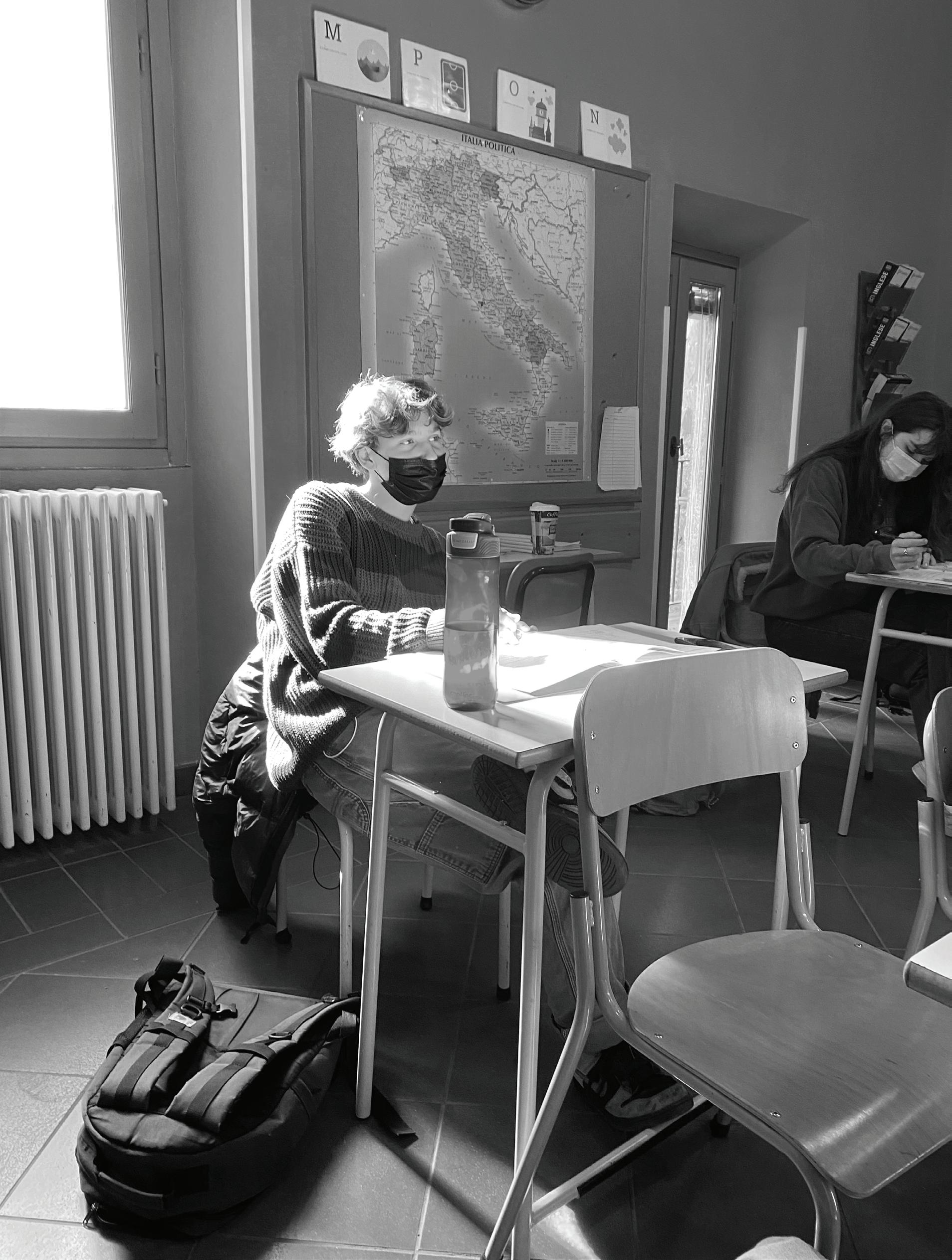
I wish Masters would make some sort of exception for students that study abroad and study a language they haven’t studied prior. I think we should be allowed to pursue whatever language we come to find and enjoy. I think Italian is a language that will benefit me most in the future.
Biscetti said that learning many different sounds and grammar rules is confusing. “For example, I studied Spanish for eight years. I know a little bit. I studied French for five years and didn’t have enough time to master it. The scope of languages got confused in my mind. I wish my school allowed me to acquire proficiency in one language, rather than over teaching me. I only understand a small amount of many languages now.” said Biscetti.
- Quinn Halprin ‘23
When studying abroad with SYA, I lived in Viterbo, Italy, with a host family for nine months. I was totally immersed in my environment. I lived with a local host family that only spoke Italian. I took two language classes. One focused on grammar and vocabulary; the other was based on culture. A majority of the students who attend SYA Italy reach a level 5 or 6 of proficiency.
Quinn Halprin a current Masters senior and alum of SYA Italy said, “I wish Masters would make some sort of exception for students that study abroad and a language they haven’t studied prior. I think we should be allowed to pursue whatever language we come to find and really enjoy. I think Italian is a language that will benefit me in the future. I don’t think
reach a level of proficiency in a range of topics. In the US, just 20% of students learn a foreign language. In parts of Europe it reaches 100%. Across the whole of Europe the median is 92%. Knowing another language is a necessary life skill. It pushes your brain to get familiar with new grammar and vocabulary. It trains your memory to recall different terms.
More importantly, it allows you to connect with another culture and build a global perspective. English speakers are privileged because the world caters to us, but we shouldn’t use that as an excuse to limit cultural contact. It is admirable that Masters helps promote language learning for its students. Although, it is also important that
Now, as a senior and proficient Italian speaker, I am required to take Spanish III at Masters. I feel as though I have surpassed the intention of the graduation requirement. Just because I chose to study abroad, does not mean I was no longer a Masters student. My junior year studies did not take place in Masters Hall, but learning was still happening. I wish my junior year studies contributed to my Masters graduation requirement. I also fear that taking Spanish this year will have an adverse effect on my language studies. I am concerned I will struggle in the class having not spoken or studied Spanish in over a year. Other students have been studying the language more constantly. But mostly, I fear it will interfere with my dedication to Italian.
8 OP-ED TOWER/ NOVEMBER, 4 2022
MASTERS SENIOR PARKING LOT is over owed each morning. However, not all of the cars belong to seniors. This has caused outrage amongst the senior class. The Senior Lot, is located in front of Masters Hall and next to the tennis courts. This problem has affected many seniors. Maia Barantsevitch expresses her views on the issue.
TARA PHILLIPS
HARRY XIONG//TOWER
TARA PHILLIPS ARGUES THAT Masters student’s experience abroad is not being acknowledged or appreciated by administration. Phillips studied abroad in Italy her junior year. Photographed above is former Masters student Mac Alexander, in a classroom at School Year Abroad (SYA) in Viterbow, Italy.
TARA PHILLIPS/ TOWER
“
HELPING UKRAINE

Masters parent, Roxanne Todor assists war-affected Ukrainians
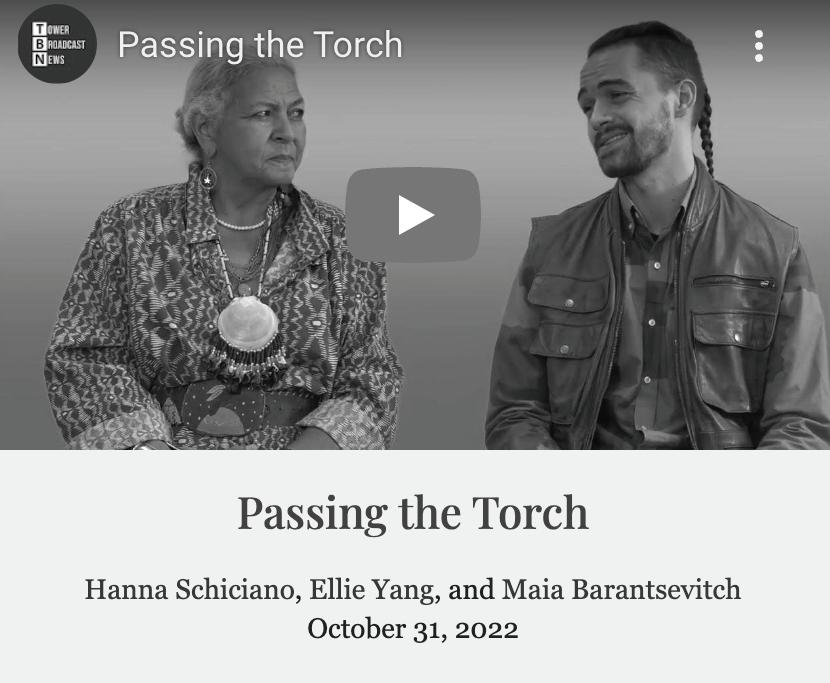 PhilliPs Lead Opinion
PhilliPs Lead Opinion








Masters parent and neurosurgeon Roxanne Todor went on a two week trip this past September with Harvard Humanitarian Initiative to Kyiv, Ukraine, where she worked directly within the country as a medical professional assisting those affected by the war.
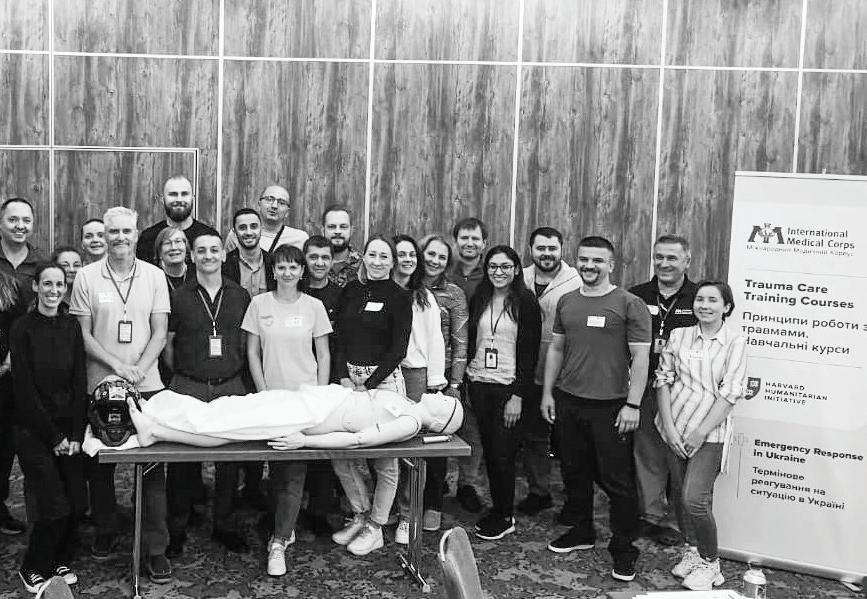
Since the start of the war on February 24, 2022, millions of Ukrainians have been displaced. Over 6 million Ukrainians have fed their homes. According to the International Rescue Committee, this crisis has led to the largest and fastest displacement since World War II, and the Ukrainian people are in dire need of humanitarian assistance. This humanitarian crisis has severely impacted Ukraine’s already weak health system and the Ukrainian people are in desperate need of medical services and equipment.
In collaboration with the International Medical Corps, Harvard’s Humanitarian Initiative recruited certifed “Advanced Trauma Life Support” instructors, including Todor, who was joined by fve other physicians from across the US in addition to hospital personnel and nurses as part of her medical educational mission.
“We worked as a group and taught three simultaneous courses for both nursing medics, ambulance drivers as well as physicians,” Todor said.
Advanced Trauma Life Support is a standard course that’s taught in the United States. Todor and her colleagues had to translate the course into Ukrainian, in order to provide Ukrainian and English courses. “Most of the people who know how to manage severe traumatic injuries are already at the front taking care of injured war victims,
but they don’t have enough people,” Todor said. “We trained physicians who have less experience with trauma to be comfortable dealing with it, as well as making sure that the support teams, the ambulance drivers, and nurses are all working on the same kind of paradigm.” She continued,“This is important because one in four people who die probably die unnecessarily from injuries that could be treated if they had enough trained people.”
Todor endured a diffcult process to work in Ukraine: frst she few to Warsaw, Poland and then she bicycled to Poesia, a smaller city close to the border. From there they took a van to the border, where they walked a mile uphill into Ukraine. Once Todor entered Ukraine, where a van was provided for the team of doctors to reach Kyiv, a ninehour drive. Todor and her group met with Ukrainian physicians in order to modify their teaching plan based on the Ukrainians’ experience and feedback.
While teaching Advanced Trauma Life Support, Todor led a mock mass casualty exercise, assigning roles to the class including trauma resuscitation. “The best way to teach people after lecturing is to give hands-on practice,” said Todor. In basic lectures, Todor went over head, abdominal, and thoracic injuries. “I always teach breathing circulation as the primary way to save somebody’s life, and so within each injury we go through, we try and get them to do that. So it becomes
second nature, kind of like CPR,” said Todor.
Todor taught two full classes of ATLS to about 35 physicians. Todor also taught a course to 70 civilians called “Stop the Bleed”. This course is equivalent to CPR for trauma. Todor also documented a great need for medical supplies. The extra supplies she used for lessons were given away. “I think right now what they need is blood. They need to try to get people to donate locally. They also need the supplies like tourniquets to stop the bleeding,” said Todor.
The crisis in Ukraine has dramatically limited health services. “I think their system is in the process of being modernized but it’s still different than the US system. They don’t have typical emergency rooms like we do here. They have a very specialized hospital system. Typically, there’s
an ambulance doctor who goes out and then they decide where the patient will go, but that doesn’t work in a combat situation or when you have multiple casualties or trauma. Every hospital needs to be able to help out so that no one fa cility is overwhelmed. So what we were doing as part of our teaching was not just hands work that focused on how to manage individual pa tients.” Todor also taught “Triage” and mass casual ty management. “Triage is how to use the resources optimally to save as many people as possible,” said Todor
Todor has personal con nections to Eastern Europe. In fact, her daughter’s grand mother is from Crimea. “My father also came from Hungary as a refugee In 1956 during the Hungarian Revolution,”
ning on doing a study abroad next year in Russia, but that’s also no longer a possibility,”
said Barantsevitch.
Todor’s family was taken by surprise when she frst told

She continued, “Initially we were critical of her decision to go, but we were all very proud that she was going. We are so lucky to have someone like her in our lives to look up to who was willing to put herself in a dangerous situation to help others because she cares so much. Although it was hard, I admired her a lot for what she was doing.”
As of now the areas where Todor worked are under attack. Russia has intensifed its missile attacks targeting energy and water infrastructure. Kyiv was getting back to normal before Russia renewed its attacks. “I’m thinking of the interpreters I worked with who were such wonderful, nice, friendly, bright people who really want to see their country move forward. It’s heartbreaking,” said Todor. In the future, Todor would like to continue her work in Ukraine. “If I fnd an opportunity where I can be helpful and it’s reasonably secure, then I will hopefully be able to return maybe after the winter,” Todor said.
Web Preview:


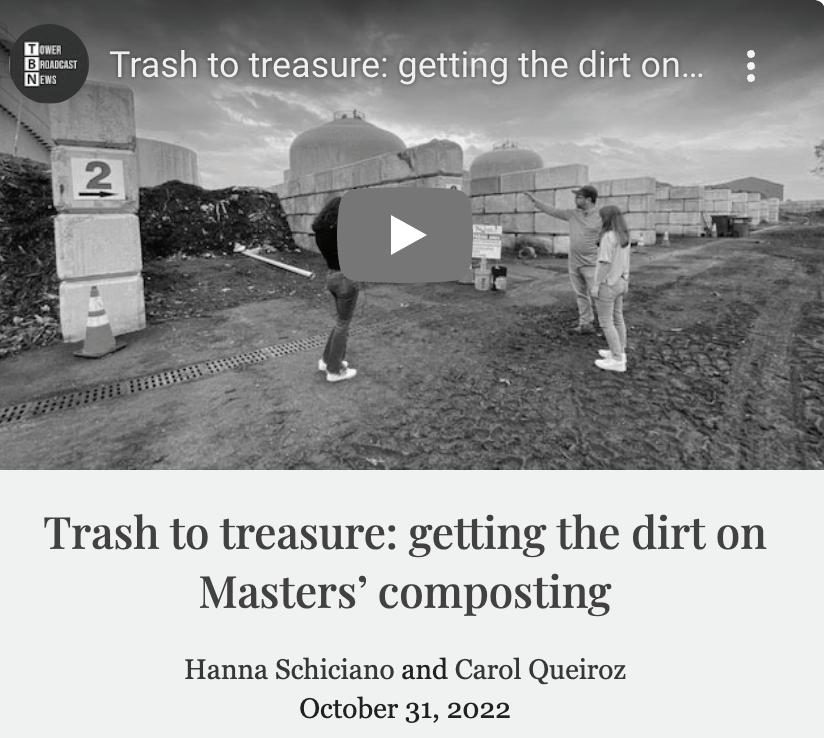
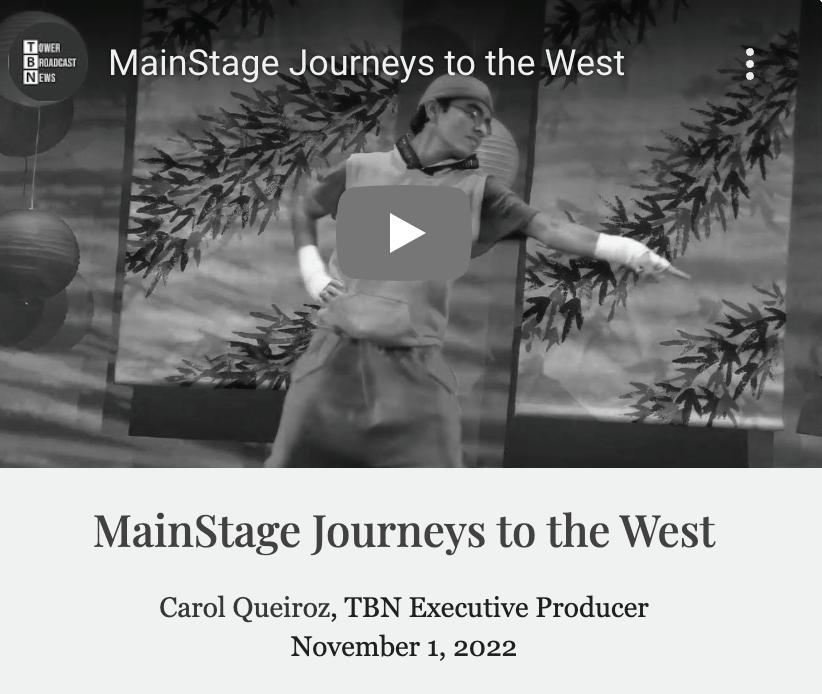




Stacey Lacy ‘93 heads Citibank Asian divison






































TOWER/NOVEMBER 4, 2022 FEATURES 4
said Todor. The father of Todor’s eldest daughter, Kyla Barantsevitch ‘21, is initially
Maya
ROXANNE TODOR
CHECK OUT OUR NEWEST TBN SEGMENTS
HARVARD HUMANITARIAN INITIATIVE MEMBERS and Roxanne Tudor left middle gather in Ukraine to help emergency response efforts. They practiced Trauma Care Training Courses.
STACEY LACY
ROXANNE TODOR
PICTURED ABOVE STACEY LACY ‘93, Masters alumn is now in charge of Asia
Paci c
Operations and Technology for Citibank
On Oct. 17, Masters alumna and Trustee, Stacey Lacy 93’ visited the International Relations class and shared with the students her diverse cultural background as well as her earlier experiences at Masters. Lacy now works as the APAC Managing Director and Head of Operations and Technology for Citibank. She currently manages over 40,000 people, and has been serving in these roles for 23 years. Lacy was born and raised in Hong Kong, before attending Masters. As an International student and sometimes an outsider looking in, Lacy struggled to fnd her sense of belonging in face of racial discrimination.
Read full story on web
Maya PhilliPs & Marianna Gu Lead Opinion & Lead Features
Every summer, over 550 students in The Masters Upper School anxiously wait to see their schedule. This school year, that lucky day was July 29. Students and teachers’ schedules are done but are the culmination of long hard hours starting in February for Sara Thorn, associate head of the Upper School, and her colleagues.
Scheduling at Masters is mainly run by Thorn. To assist her in the process, Thorn works with Sandra Sclafani, offce manager/upper school registrar, and department heads. Communication with all these people is essential to this process; for higher level classes, Advanced Placements and honors classes, department chairs need to verify that a student is appropriately prepared and approved to take that class.
“We just communicate as much as possible during that March to June period,” Thorn said.

The scheduling cycle starts for the next year of classes on Feb-


nights,” came out on the 21st of October after having been hyped up for months.
The album is, in my opinion, skipless: every single song on it absolutely goes hard. My favorite, though, is “Lavender Haze,” the first track on the album, and what an opener it is! I personally think it’s very à propos how the opening line of the song is “meet me at midnight”, because since many Swifties stayed up until midnight to hear the album when it was released, they were liter -
JENNY XU//TOWER
plained that this means that students are provisionally approved Thorn and her team get into full gear once the school year fnishes.
and create a grid with all of the students in the Upper School. The process takes one to two weeks. Thorn going over each individual schedule to make sure she didn’t unfairly overload any student in a given semester.
Even with the classes offcially approved on July 29th students did not receive their offcial schedule until the day before school started.
“
My hope is that this Wintermisison experience will be a healthy break for the students and the learning that happens in them will make the learning in other classes a little richer.”
Thorn explained that this is because as new students come in ,placements for classes are still being done Thorn expressed how this process is levied by the use of technology. A grid is created allowing the department heads to verify classes in real time. Technology, though helpful, can also be a hindrance in this whole process.
- Jason Hult
Looking ahead, a new edition to the schedule has been created: from January 24th to January 27th, Wintermission will occur. Created by Jason Hult, Director of Learning Initiatives, and Thorn, this 4-day mini term will allow students to pick from 52 classes. In those 4 days, students will only have class in the one course they picked. These will be different in style and content compared to other classes this school year. Hult even expressed that some of these classes will be able to go to the city and more. Classes will be taught by Masters teachers independently or in teams. .
“My hope is that this Wintermisison experience will be a healthy break for the students and the learning that happens in them will make the learning in other classes a little richer.” Hult said.
“It is very complicated to make LMS do what you want it to do,” Thorn said. You really have to encourage it.”
Even with all the chaos involved in scheduling, Thorn sees a positive.“I am meeting a lot of the new students and seeing people after summer,” she said, “so
Hult expressed that even with the complicated logistics of the process that this is a new opportunity for the school as a whole.
“Overall it has been really inspiring to see what the teacher wants to do and this could stretch our understanding of what school is and what school can be.” he said.
Taylor invites Swifties to “meet her at midnight”
up my history, but you weren’t even listening.”
Another track from the album which I adore is “Karma.” When Swift announced that there would be a song titled “Karma” on the album, the Swifties collectively lost their mind; there had long been a theory that Swift had a lost album between 1989 and Reputation called Karma. The song does indeed sound like it fits in between those two albums, with its upbeat tune, trap beat, and lyrics about, well, karma.
Social media activism
How teens are leading social movements from behind a screen
A VIV E MERY
Every time you open social media, there’s always something political popping up. Whether it’s someone’s story, a post, or just scrolling through your feed, it’s hard to not see activism when you open TikTok, Snapchat, or Instagram. Because people under 18 can’t vote, they use social media to their advantage, talking about any topic which they think is important. But, it’s important to ask whether what teenagers are doing on social media is really making a difference in the world, or even a difference to themselves. English Department Chair, Geoff Nelson said that “there is a difference between taking a moral high ground just for the sake of amplifying one’s own goodness versus trying to authentically expand someone else’s perception politically that might make them a better person or more aware in the world.”
Masters Accounts
In our own community, we’ve had two social activism Instagram accounts arise, @sexualassaultatmasters, in September 2022 and @ blackattms, in June 2020, both of which have inspired real changes to the rules or guidelines at Masters. Senior Mia Romanoff, who wrote her Masters Thesis paper on youth protest, explained that “A large part of the reason why accounts like @blackattms work is because they do threaten the economic position of the school, it’s not just starting a conversation, the existence of that conversation has very real consequences to the school’s reputation.” She continued, “what makes those accounts different is that negative media attention in
those instances was political and economic versus just generally bringing awareness.”
Summer 2020
In 2020, following George Floyd’s death, social activism spiked. Jake Lefort ‘23 noted “That was not exactly the birth of so cial media activism but it was the frst time everyone was really involved in posting on social media about something that ef fects law and requires activism.” Every
where on social media, people were posting about the murder. Tik Toks were blowing up on how to support small Black owned businesses, and people were beginning to be open about their own stories of racism or micro aggressions. They were posting informational slides about where to donate, what you can do, and
generally spreading awareness through social media infographics. “I don’t think it would’ve been seen as such a big deal if social activism hadn’t taken hold then.” Lefort later said.
However, there is a lot of debate surrounding the fne line teenagers walk between performative and non-performative activism. “We can’t make meaningful change if it’s being perpetuated by our need to boost how other people perceive us,” Romy Girzone, ‘24 said.
Romanoff touched on how she sees per
formative activism, “I don’t necessarily think that performative activism de-rails any movements. Rather it just makes people think that movements are doing more than they are. Performative activism isn’t harmful, it’s annoying.”
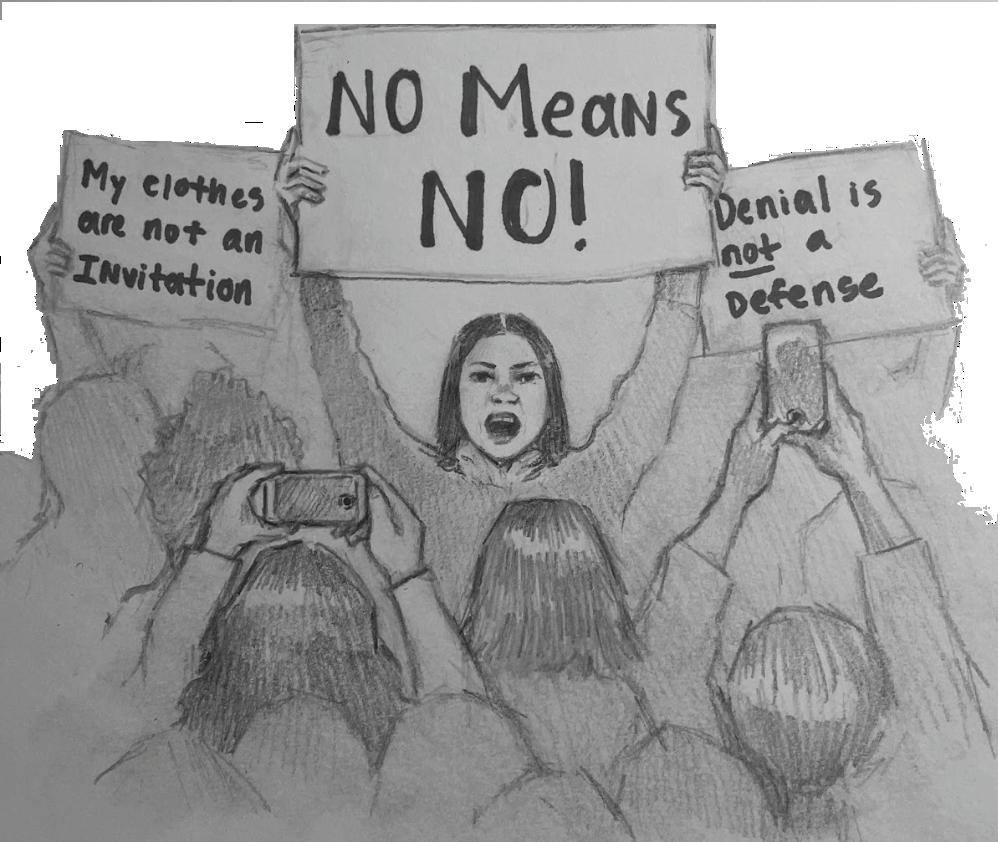
She continued, “I think the average individual actually most of the time isn’t really able to be a performative activist; I think performative activism comes with people who have resources and large platforms and who are trying to appease a larger audience.”
Affects of online activism
Despite the sometimes performative side of posting on social media, teenagers have been using apps to create a real change in the world. Teenagers on TikTok bought tickets to a Trump rally in Oklahoma in an effort to take tickets from people who would’ve actually shown up. K-pop fans drowned out a #WhiteLivesMatter tag by flling it with photos of their favorite artists, and others have monetized Youtube videos to donate the proceeds to charities or small businesses. Many other movements have been hoisted along by social media throughout the last few decades. #MeToo, the Ice Bucket Challenge, and #LoveWins were all online phenomenons which translated into real life.
Social media can be an amazing way for young people to talk about issues they’re passionate about, but it’s important to note that social media can become performative and corrupt very quickly. People can come across social media activism, and blindly scroll past it, meaning it doesn’t create as much of an impact as hoped. It may be in a person’s best interest to instead directly help a cause through donation or volunteering. As Nelson said, “Sometimes awareness produces political thinking and sometimes awareness produces the status quo, people are aware of what they’re seeing but move on with their life.”
10 FEATURES NOVEMBER 4, 2022
The ins and outs of scheduling classes and Wintermission
Lead Features
THE PROCESS OF SCHEDULE creation is a long and complicated. Sara Thorn, associate head of the Upper School, spends her summer dedicated to preparing for the students arrival on campus and in classes.
Copy Editor
L UCAS S EGUINOT
SYDNEY STARKEY//TOWER
SOCIAL MEDIA CAN BE used to spread a message, but is often a double-edged sword. Aviv Emery explores the current way teens are using social media.
Camaraderie helps girls varsity soccer foster team spirit
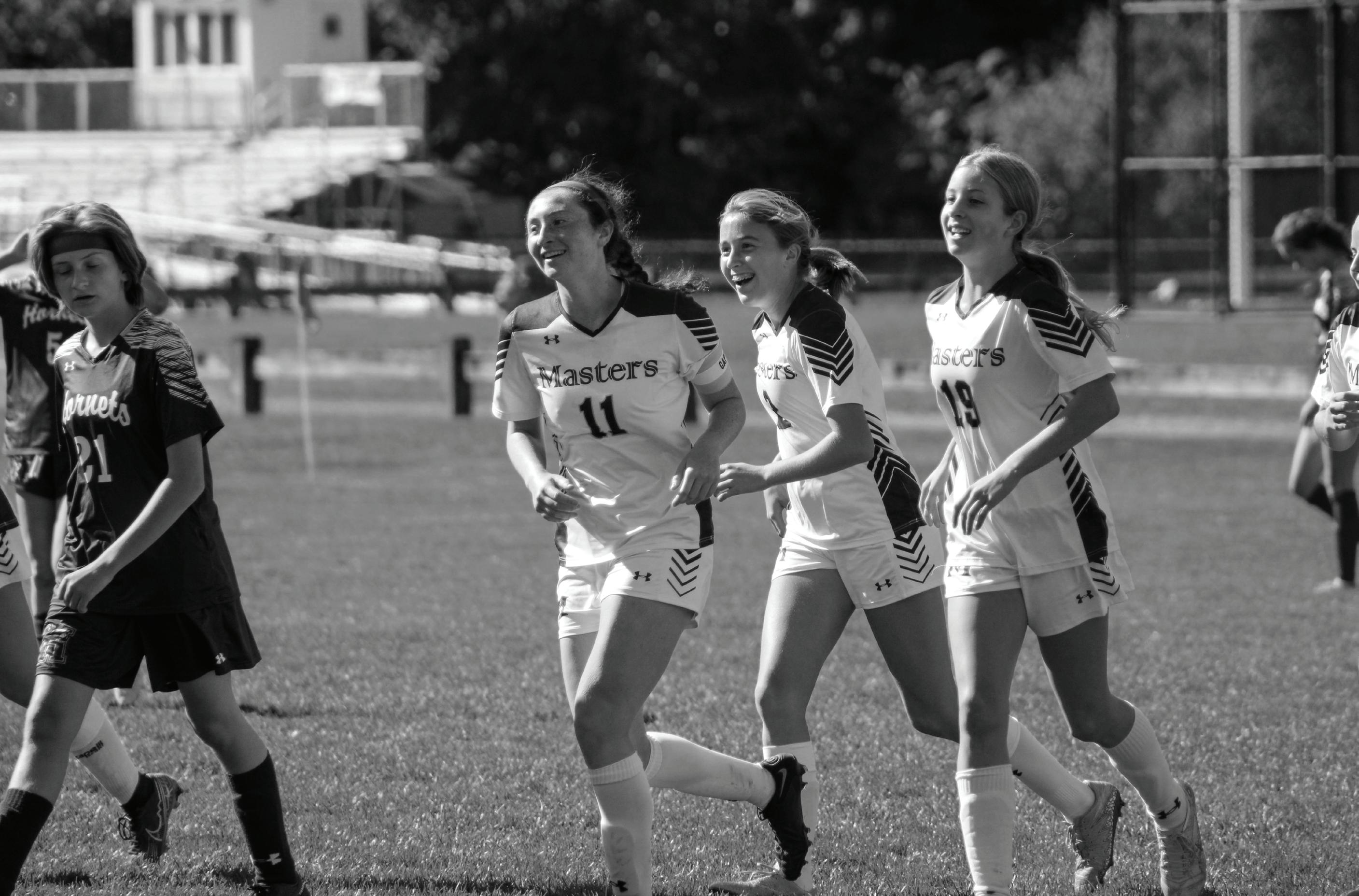 Sokolenko Staff Writer
Sokolenko Staff Writer
This year, the Masters girls varsity soccer team welcomed eight new members. In the end, the team is made up of seven seniors, two juniors, and eleven freshmen and sophomores. With so many young and new members, the challenge arose of developing confidence in oneself and each other.
Team’s coach Juan Cobos said that maintaining mental toughness helps build confidence on the field. Along with technical skills and physical strength, the team also spent time developing mental skills.
“When the ball comes in, some of us get very antsy and nervous, and the body starts to break down because the mind is going too fast,” Cobos said. “So it’s training your body to say, ‘Take a deep breath, you got this,’ and then make contact with the ball.”
try to make it so that the game is still fun.”
Schapiro, who has played soc cer for twelve years, applauded the dedication of her younger team mates and their hard work during the season.
“Everyone showed up to prac tice each day enthusiastic to learn and get better as a collective and individually,” she said. “No matter the difficulties that came our way, for example, if we were to concede a goal in a game, it only pushed us to come back stronger.”
For Marlowe, Schapiro, and Simonds, this season is the fourth one on the team, but the first one as captains. They felt that their lead ership skills really helped them in this new role.
“I think I’m able to motivate the team with warm ups on the field and keeping the morale up and helping everybody stay organized and play to their best and strongest abili ties,” Marlowe said.
the most import ant part of her role was making strong connec tions with others.
-
The friendly and supportive atmosphere during the practices also helped to overcome the nervousness among the players. The team’s captains Hannah Schapiro, Lauren Marlowe, and Stella Simonds worked a lot on making the team more close-knit.
“The tight knit unit comes from them [the captains] being supportive of each other, understanding that some of our players are young,” Cobos said. “They don’t put pressure on them. Instead, they try to make their lives easier. They
“I’ve really been thankful that I’ve been able to connect with every single player on this team, even if it’s their first year or their fourth year,” she said.
With the COVID-19 pandemic, the captains noticed the sense of community in the team weakening, and made it their goal to bring it back. Looking back on the season, their efforts paid off.
“I’m most proud of how we have worked together as a team.” Marlowe said. “I think we’ve done really well communicating on the field
and trying to prove ourselves as a Master’s girls soccer team.”
Cobos also believes that the ability to rely on each other helped the team to improve on their skills on the field. “Our team is incredible when we start passing the ball,” he said. “When our team decides to pass and use each other and
Girls varsity volleyball builds a new identity
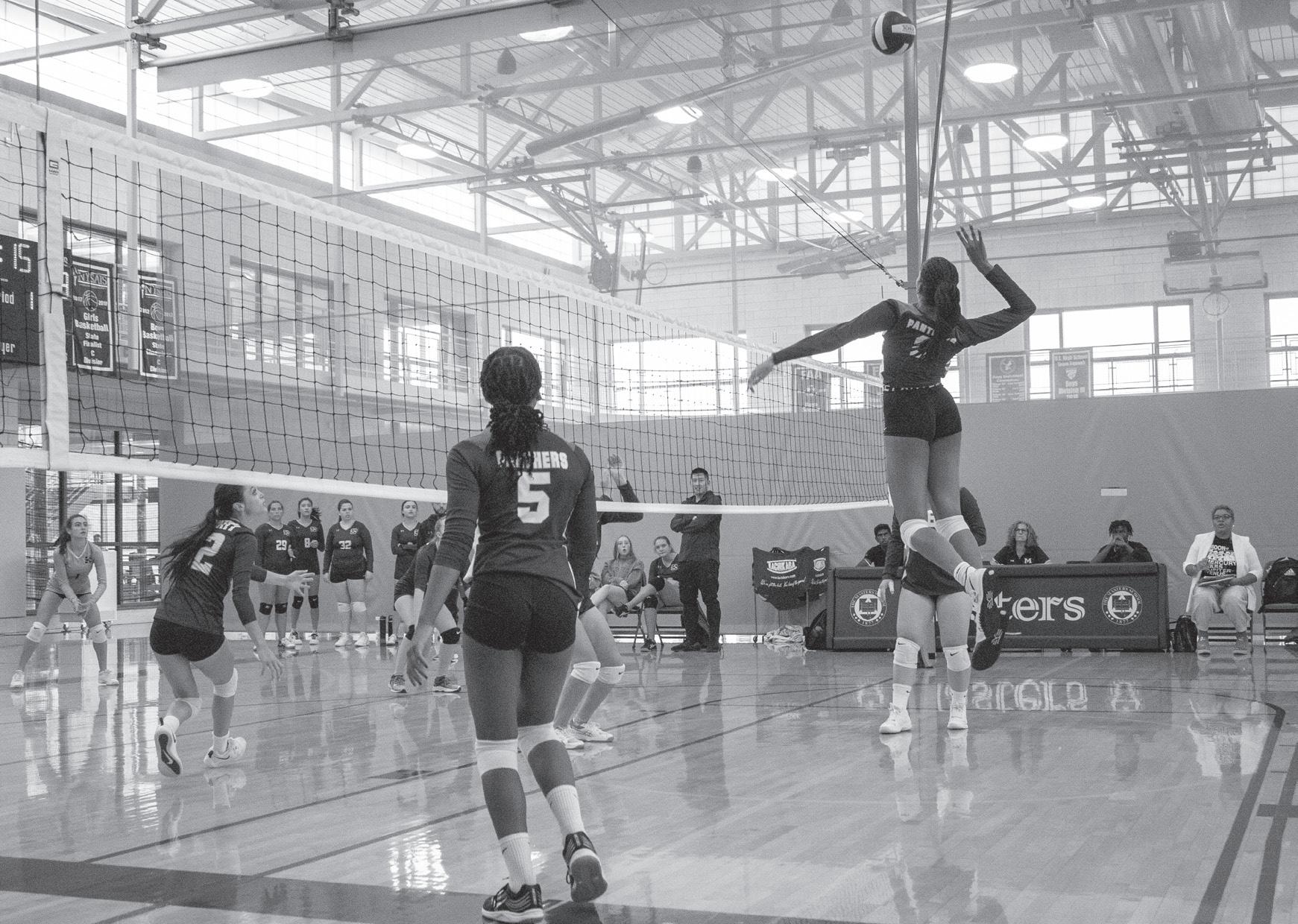
trust each other, their confidence grows. And that’s when the accomplishments are incredible, because we’re able to build the attack from the back or from the midfield.”
With their last game on November 1, girls varsity soccer has had a pretty balanced season with three wins, seven losses, and four ties.
Cobos felt that it was their team spirit that helped the team to win the games.
“The way that we won them was we did it together,” he said. “Everyone got involved. There wasn’t just one player that said, ‘I’m gonna score every goal,’ or it wasn’t just one player that said, ‘You know
what, let me take over.’ We played a team game. And that’s what this sport is. It’s a team game.”
Philly bells are ringing predicting a world series win for the city of Brotherly Love
matthiaS Jaylen Opinion Editor
Philadelphia Phillies or The Houston Astros? That’s been the big question plaguing baseball fans. The World Series is currently 2-1 with the Phillies leading. So far the Phillies have had a Cinderella story playoff run so far beating the St.Louis Cardinals and 2 NL MVP Candidates Nolan Arenado and Paul Goldshmidt, the 101 win Atlanta Braves, and the star studded San Diego Padres.
The Astros have also had an enjoyable playoff run going 7-0 in the American League Division Series
and Championship Series, sweeping both the young and flashy Seattle Mariners and the AL East Champions, the New York Yankees.
The Astros and the Phillies both play excellent defense so the series will most certainly be decided by pitching and offense.
The Astros clearly have the better pitching rotation with Hall of Famer and the 2022 ERA leader Justin Verlander and 2022 All-Star Framber Valdez leading the charge . Despite the Astros elite pitching rotation, the Phillies have gotten excellent production as well from their own ace pitchers: Aaron Nola and Zach Wheeler. The Phillies bullpen has been strong, especially with their closer Zach Efflin.
Ultimately, the Phillies offense will just purely overpower the

Houston Astros. The Philadelphia Phillies will be your 2022 MLB World Series Champions. In the playoffs, their stars are performing well with Bryce Harper having 6 homers and 13 RBI and Rhys Hoskins with 6 homers and 12 RBI, but their supporting cast is contributing as well. As a team the The Phillies lead the MLB in the postseason with 22 home runs, 71 RBI, 42 walks, and 28 doubles. They also have an OPS of .747 and they only trail the Toronto Blue Jays in this stat.
Though the Astros have a solid offense and are no easy team to beat, they just won’t be able to keep up with the Phillies elite level of offense.
The final verdict: Phillies win the World Series in 7 games.
Sports Editor
As the FAA playoffs approach, Masters Girls Varsity Volleyball is continuing their dominant season. The Panthers have come into this year with a new mentality and culture around the team largely with the help of new head coach, Bai Zhang, better known to the team as Coach Betty. Though they had shown flashes of being a standout team in years prior, Zhong gave the team what they needed to cement themselves as a top team in their league.
The culture and attitude brought to the table by each and every member of the team greatly affects their performance and the team’s success. When talking to Nayiah Jarret, a junior outside attacker, about the difference in the team’s success this year from years prior she said, “I think the coach
made a big difference because she just wants to make us better. It’s also about our team dynamic, we’ve bonded so much more this year, really working as a team and being more cohesive.” It seems as if now more than ever, the team is clicking on all cylinders and is ready for a huge run in the playoffs, but the change in coaching wasn’t the only change helping this new team dynamic thrive.
I think I’ve grown a lot, there have been so many players that come and gone from the volleyball program that have all taught me so much.
-
take on new roles each year as well as learn and grow as a leader. She said, “I think I’ve grown a lot, there have been so many players that come and gone from the volleyball program that have all taught me so much. From the seniors on the team when I was young that have gone to play club at their colleges, to me being a senior, a leader and a captain now I’ve grown a lot.”
Ashleigh Woodruff ‘23
Senior Captain and division 1 commit Ashleigh Woodruff has taken a huge leadership role for this young team throughout the year. Woodruff has always been a stand out player but the star has found herself flourishing in her role as mentor and leader on the court. Being her fourth year with the program, Woodruff has had to
The team has an overall record of nine wins and seven losses securing a spot in the FAA playoff starting on November 7th. After a commanding 3-0 victory during the team’s Senior game against Rye Country Day School on October 28th, the team is hoping to capitalize on this momentum going into the playoff in the coming weeks.
TOWER/ NOVEMBER 4, 2022 SPORTS 11
Viktoriia
I’ve really been thankful that I’ve been able to connect with every single player on this team, even if it’s their frst year or their fourth year.
Stella Simonds ‘23
“
SOPHOMORE ANNA MOSCATO, FRESHMAN Clio Foley and senior Hannah Schapiro celebrating during their away game against Greenwich Country Day School on October 7th. For senior Schapiro this is her last season with the Panthers. She committed to the University of Maryland to play soccer.
ALPHA ZERFU/TOWER
adam Bello
“
SENIORS CAMILLA ARTHUR AND Ashleigh Woodruff in an early season game. Woodruff, shown going for a spike, is a Division 1 commit attending Stony Brook for college next year.
STAR OUTFIELDER BRYCE HARPER looks to catch a y ball during a game in the regular season. Harper has been a household name in baseball for years formerly playing with the Washington Nationals. The 30 year old joined the Phillies in 2019 and has been playing with the team ever since. He is now a 7 time allstar and has cemented himself as one of the sports greatest talents.
IAN D’ANDREA/ CREATIVE COMMONS
For more sports stories, visit Tower.Mastersny.org
MATTHIAS JAYLEN/ OPINION EDITOR
SportS
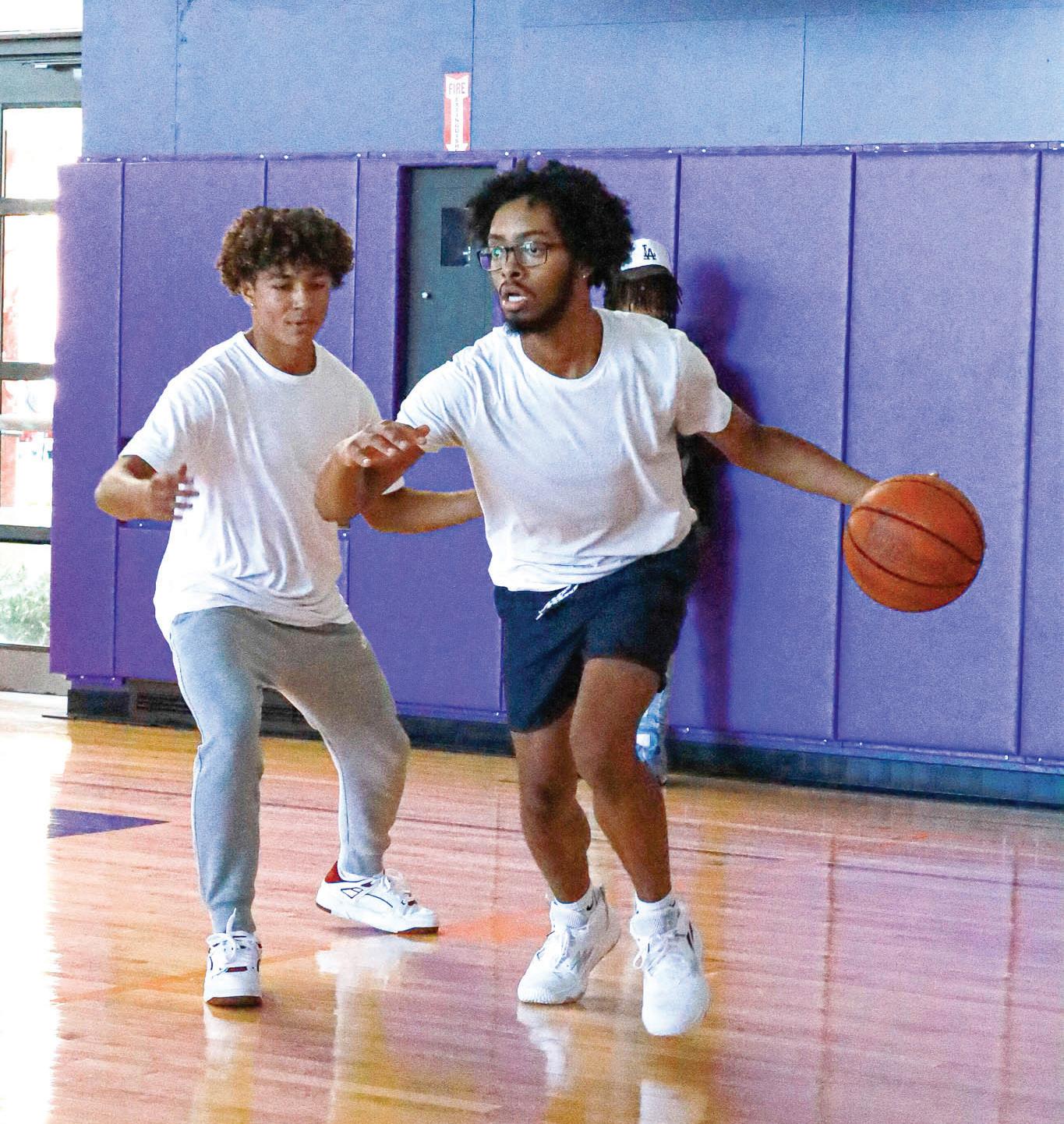

Boys soccer prevented from defending their NYSAIS crown
to be better athletes and competitors and we lost a bit of that in losing NYSAIS.”
Ayear after securing the school’s frst ever New York State Association of Independent School (NYSAIS) championship, the Masters boys soccer team is not eligible to defend their title. Masters athletics teams participate in two competitions: the Fairchester Athletic Association (FAA) and NYSAIS; due to scheduling changes, the tournaments for these two competitions coincide, preventing the teams from competing in both.
“The team thought we were going to be able to defend that title, that championship, and that’s what we wanted to do because we worked so hard to win that trophy,” David Ferrando, senior and captain of the boys varsity team, said. “It was disappointing to fnd out that we wouldn’t be able to compete; knowing that another team will take our title without us getting a chance to defend it.”
The FAA is a league made up of 10 schools ranging from Dobbs Ferry to Greenwich, with the teams participating in a regular season before a postseason. NYSAIS is the collection of all the independent schools in New York, and while there isn’t a regular season league, each year there is a tournament with the best schools in the region being placed in a bracket, with the winner being crowned the best independent school in the state.
Last fall, the boys soccer team fnished second in the FAA, and were given the frst seed in the NYSAIS tournament.
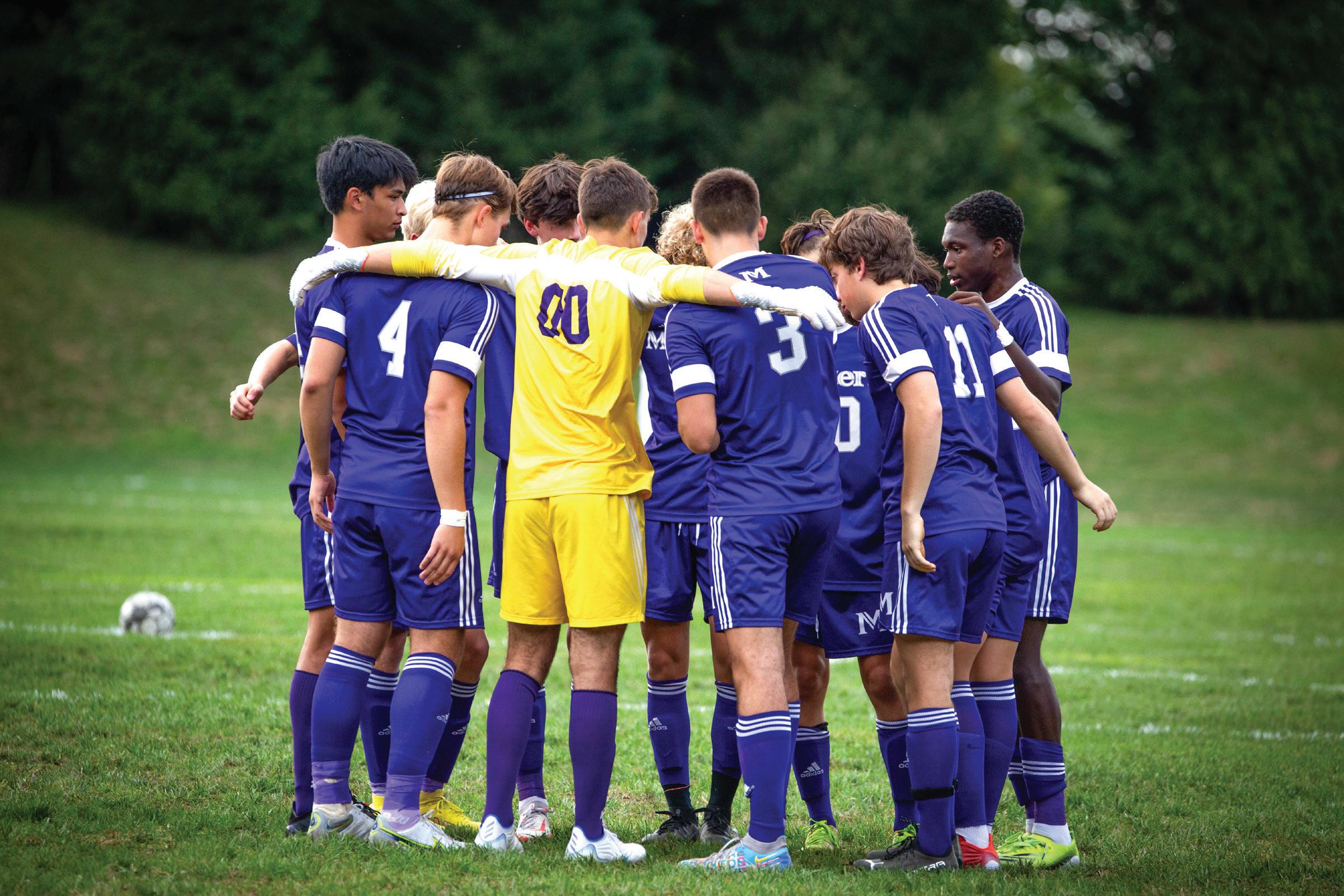
The two tournaments were scheduled a week apart, so the soccer team was able to compete- and win- NYSAIS, before participating in the FAA playoffs the following week.
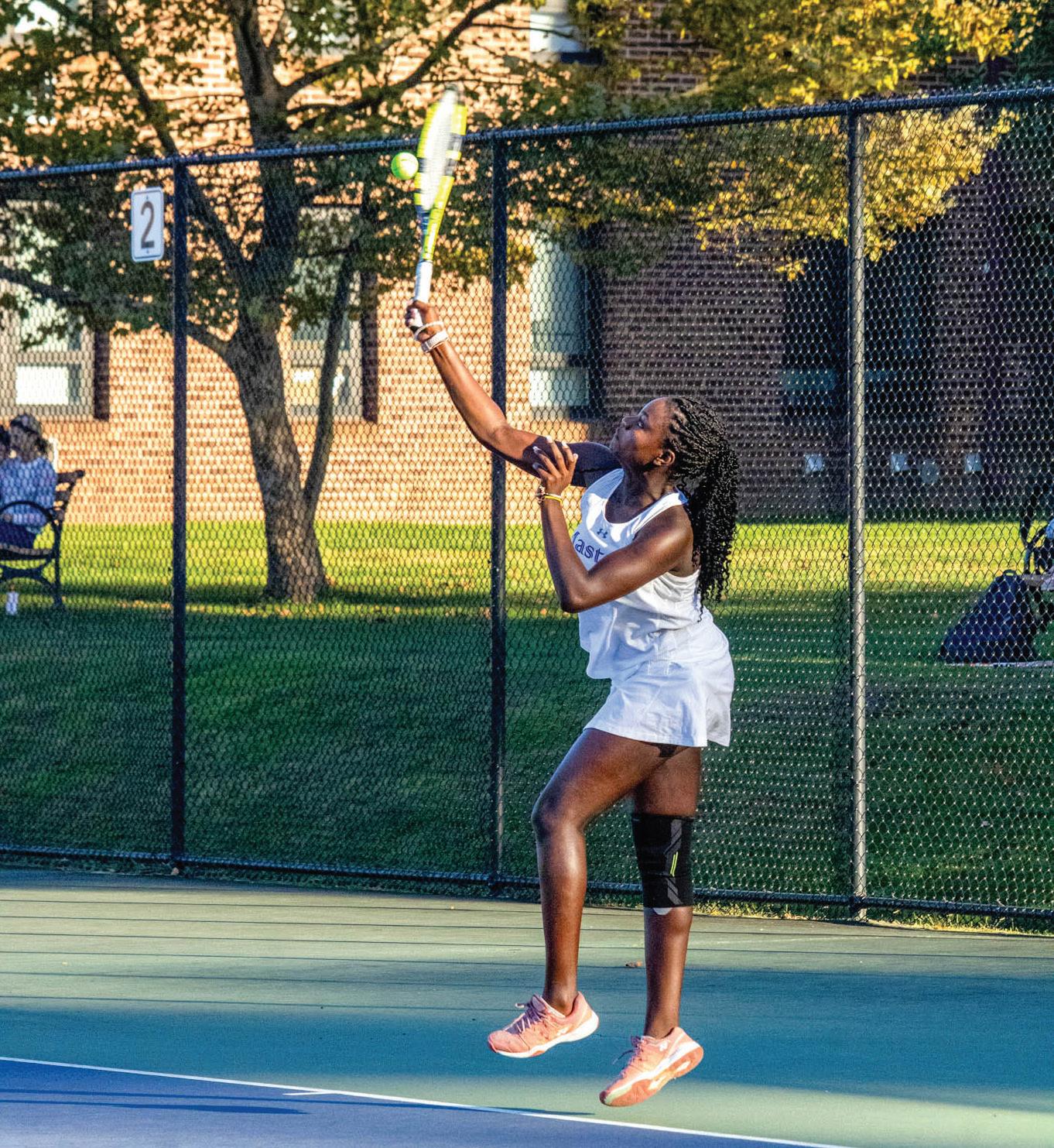
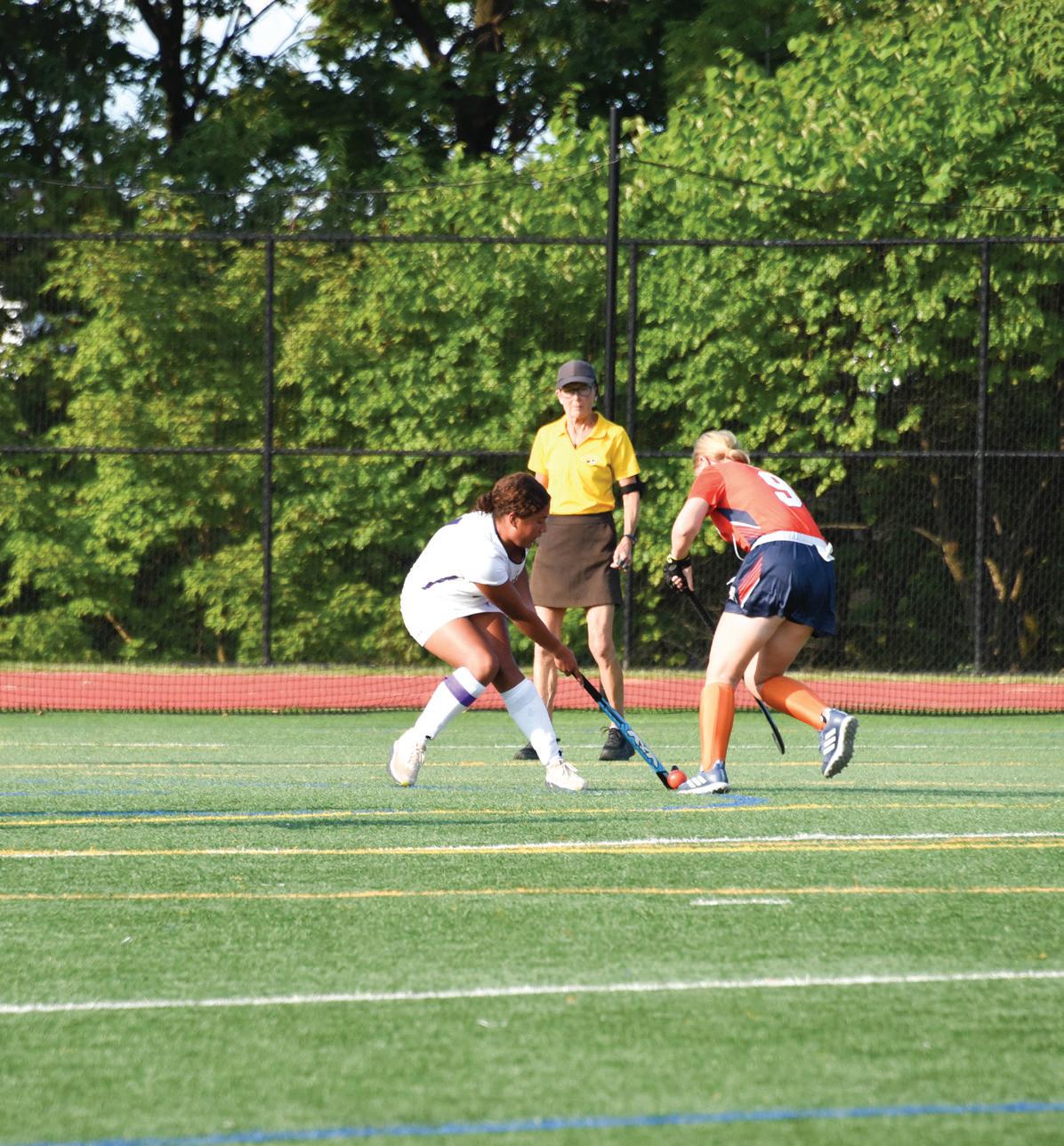 -David Ferrando ‘23
-David Ferrando ‘23
The scheduling confct impacts other sports as well.
“Every team can beneft from playing teams from various different skill levels including their level or better and teams with more experience,” said Ashleigh Woodruff, senior captain of the girls varsity volleyball team. “It pushes teams
Traditionally the NYSAIS fnal has been held at Manhattanville College for both the boys and girls soccer teams but due to scheduling changes, the fnal can no longer be held at that location. According to Neil Jaggernauth, the assistant coach of the boys varsity team, the fnal was moved to Randall’s Island where due to permit and regulations, the only time the game could be played was on Monday, November 7th, the same day that the FAA quarter fnals are held. This meant that the soccer teams were not able to compete in both tournaments due to NYSAIS not allowing teams to play twice within 36 hours. With boys soccer, girls soccer, and
“Not
is a very competitive program that knows what
Leo Schilling: the Renaissance man from the Cayman Islands
For those of you who haven’t already, meet Leo Schilling, a new junior who hails from the Cayman Islands. Schilling is a man with a great variety of interests such as aviation (he knows how to fy a helicopter), flm production, and acting, but another one of these interests is running.
Schilling has been running for four years now. “I started running two miles every morning, then fell in love with it,” he said. “It centers me.”
Schilling also cited the YouTuber Casey Neistat as a reason he took on running as a hobby: “He goes out for morning runs every day,” Schilling said, “and I’ve also made YouTube videos before, so those passions kind of intertwined.”
Schilling’s accomplishments in the feld of running are greatly impressive: in addition to running two full marathons, he’s also run several half mara-
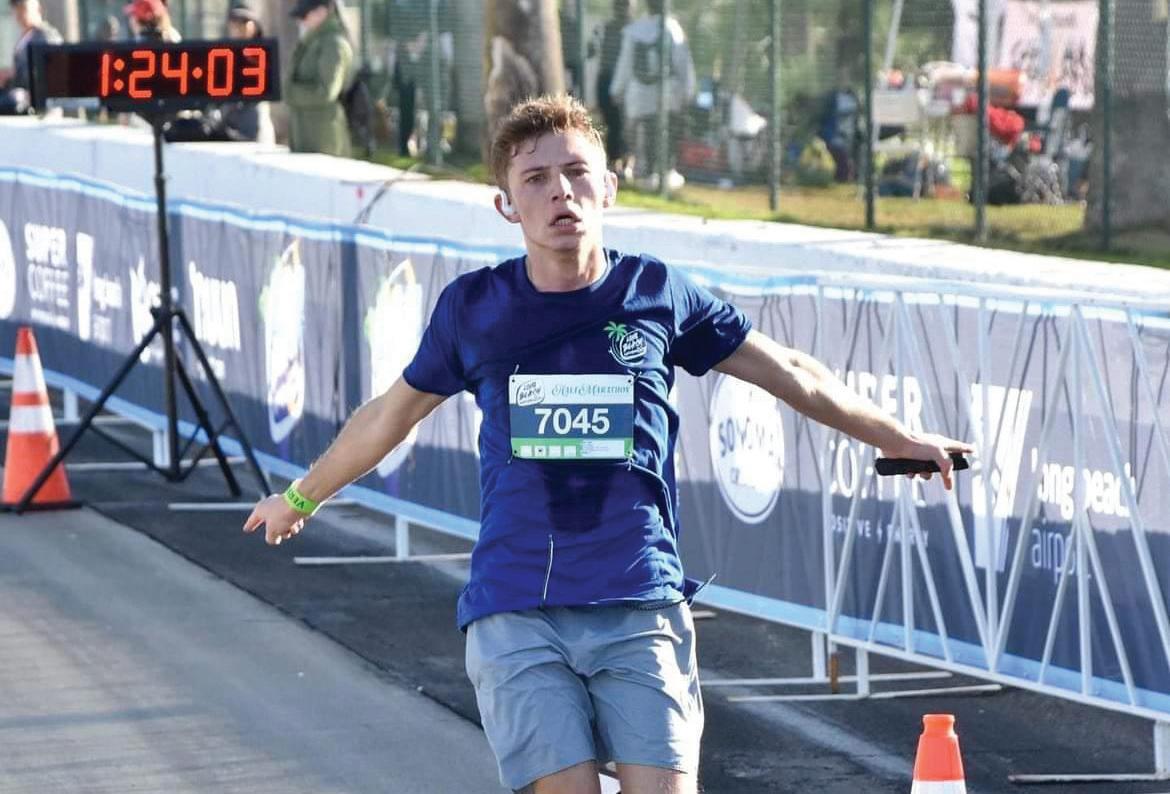
thons and has traveled to places such as Miami, Florida and Long Beach, California to run. However, despite all of the different locales in which he’s run, his favorite place to run is his homeland of the Caymans. “It’s a place that I’m used to,” he said. “It’s fat, and sure, there’s lots of humidity, but the elevation is low, so the two kind of help each other out.”
Schilling also spoke of how New York’s colder climate has helped him as a runner: “Running in a cold environment has helped me adapt to running in warmer conditions as well,” he said, “because it’s the inverse of what I’m used to.”
During the fall sports season, Schilling was a member of the cross country team, and he expressed gratitude towards his coaches and teammates.
“Here at Masters, I have two amazing coaches that are around most of the time, Coach Allen and Coach Luciano, so shout out to them,” he said. “And the Masters running team, they’ve been there to help challenge me and push me to the best. Having all their support has really helped me for the better.”
12 SPORTS TOWER/ NOVEMBER 4, 2022
girls volleyball all setting their sights on postseason play, this scheduling dilemma will pose a problem for the teams. Not only will there only be one tournament,
the competitiveness of the non-league games will also take a hit.
having a NYSAIS postseason takes some of the competitiveness out
of the games knowing that each game doesn’t necessarily count for a tournament spot; however, this
winning feels like and so we’re trying to always continue to win and to expand our goals to win more championships, ” Ferrando said.
Noah Kassell-YuNg
Lead Sports Editor
“It was disappointing to fnd out that we wouldn’t be able to compete; knowing that another team will take our title without us getting a chance to defend it.
CHARLIE COOPER
THE BOYS SOCCER TEAM gathers for a pre-game huddle. Led by senior captains Adul Salmon and centerback David Ferrando, the team has put together their second consecutive double digit win season, entering playoffs with a 11-2-2 record. The team has gone undefeated against NYSAIS opponents but unfortunately lost their last FAA regular season game–– falling to fth place. The team will travel Monday, November 7 for the quarter nal game.
aurora rose horN Lead Copy Editor
PHOTO COURTESY OF LEO SCHILLING
Schilling’s career stats:
JUNIOR LEO SCHILLING CROSSES the nish line in one of his several half marathons. Originally from the Cayman Islands, Schilling has brought his running talent to the cross country team this fall.
RYAN GUAN/TOWER
JOSH MARKOWITZ/TOWER
JOSH MARKOWITZ/TOWER
SENIOR CAPTAIN AIMEE AYALA drives the ball in a eld hockey game versus Ethical Culture Fieldston school at home this season.
SENIOR PETER VEGA DRIBBLES the ball away from the defending David Medina in an MBA regular season matchup.
04:36:07 Fastest full marathon Fastest half marathon Fastest mile time 01:23:47 00:05:03
SENIOR CAPTAIN ALEXIS ESTIME serves the ball in a singles match this fall. The tennis team nished with a winning 5-4 record.

 - Sol Eisenbeis‘23
- Sol Eisenbeis‘23












 OLIVER KREEGER News Editor
OLIVER KREEGER News Editor

















 Sokolenko Staff Writer
Sokolenko Staff Writer




















 PhilliPs Lead Opinion
PhilliPs Lead Opinion










































 Sokolenko Staff Writer
Sokolenko Staff Writer






 -David Ferrando ‘23
-David Ferrando ‘23
